
Does a college degree make you happier?
Psychologists trace the connection between higher education and subjective well-being.
METROPOLITAN STATE UNIVERSITY OF DENVER MAGAZINE | SPRING 2024
GIFT OF HEALTH FOOD AS MEDICINE DANCE FOR WELLNESS
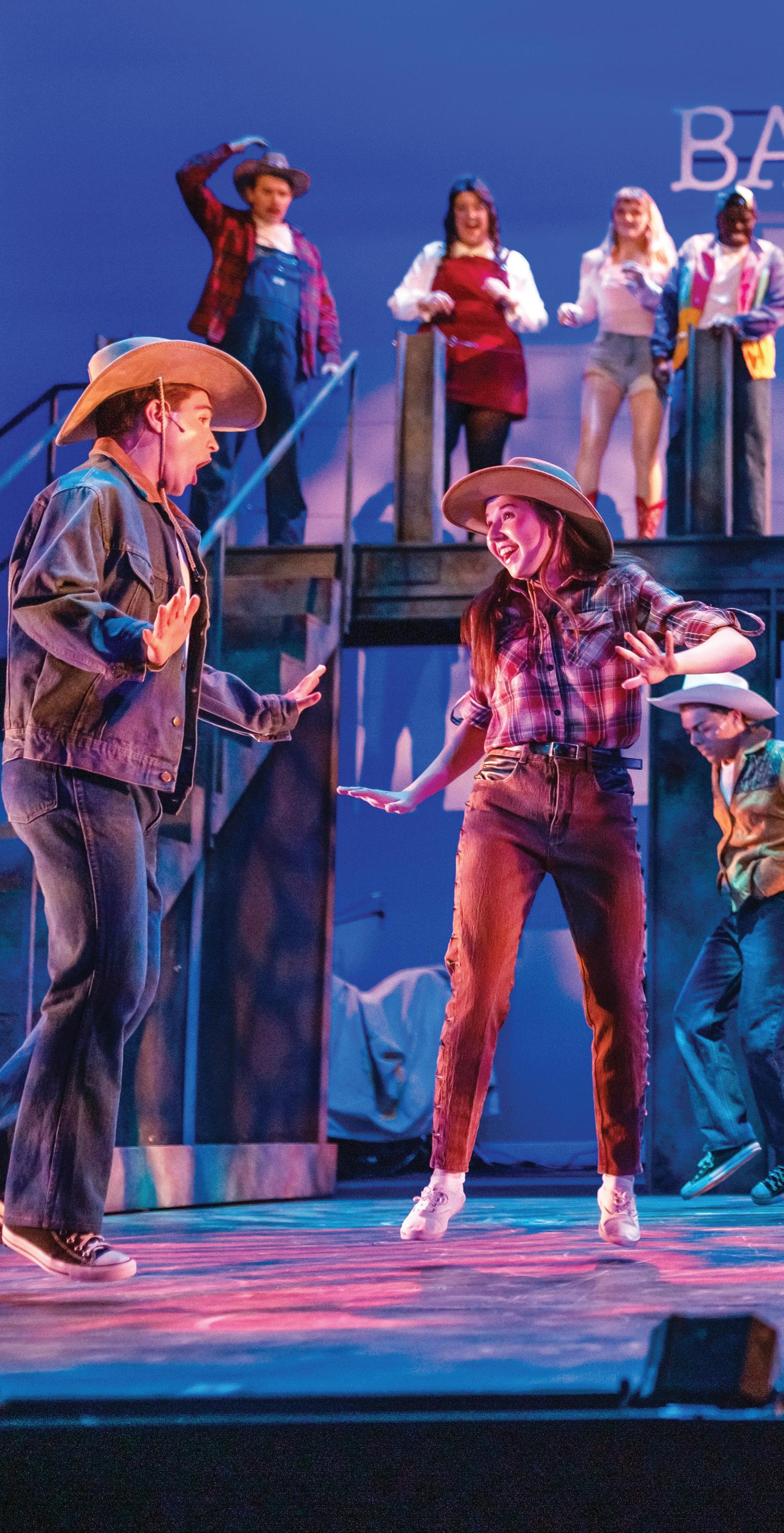
2 RED MAGAZINE | SPRING 2024 SPRING 2024 | red.msudenver.edu CONTENTS FEATURES 10 Does a college degree make you happier? Psychologists trace the connection between higher education and subjective well-being. 14 Fueling a food revolution for good health Meet the women business leaders creating a stir in the food-as-medicine movement. 18 Senior movement MSU Denver dancers lead classes to help keep older adults on their toes. 2 First word 3 News 22 Queen of Five Points Alumna Fathima Dickerson brings care to the community at her family’s Welton Street Cafe. 24 Butterfly effect Alumnus Patrick Tennyson’s commitment to conservation hinges on an unlikely set of heroes. 26 Coroner you can count on Alumna Raeann Brown works with the dead but stays focused on taking care of the living. 28 Resilience rewarded Alumnus Justin Guy turned his life around to pursue service to others. 30 Roadrunners 34 In memory 36 Chemistry professor gets right reaction Andrew Bonham helps students achieve the best possible start to their careers in science. on the cover : Illustration by Justin Metz. Colorado-flavored news and culture from MSU Denver ALYSON M c CLARAN Send correspondence and address updates to magazine@msudenver.edu

‘Footloose’ at 40
Students from Metropolitan State University of Denver’s Department of Theatre and Dance kicked off their Sunday shoes this winter with a performance of “Footloose.” The musical production, based on the 1984 film of the same name, was brought to the stage in February and March at the Auraria Campus’ King Center. Among the story’s timeless themes are the excitement of youth, the importance of listening and the power of forgiveness. Audience members at the show were treated to a delightful display of dance as a “way of celebrating life” and may have even gotten a degree or two closer to Kevin Bacon.
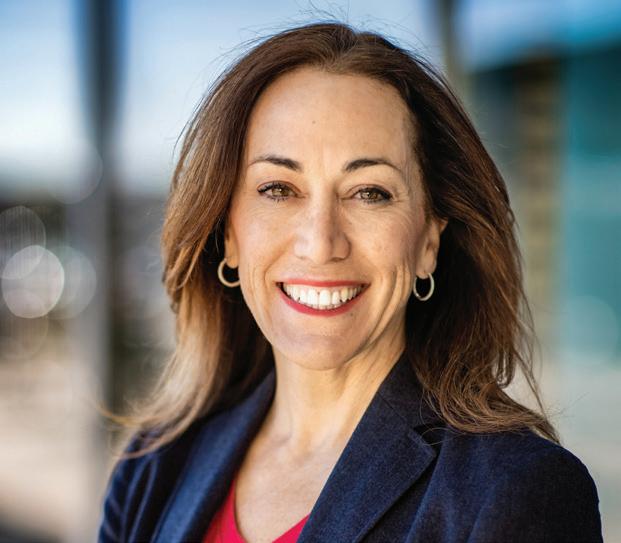
Health benefits
As someone who blocks time on her calendar for exercise, I deeply value the benefits of health and wellness. Whether it’s skiing or hiking with my husband, playing pickleball with my dad or enjoying the solitude of quiet morning yoga, movement helps me stay sharp and feel strong.
But wellness is not only about physical activity. Wellness comes from how we fuel our bodies and our minds and how we take care of one another. By those standards, Metropolitan State University of Denver faculty members, students and alumni are certainly bringing wellness to our Colorado communities and improving people’s lives, as you’ll see in this health-focused issue of RED Magazine.
Our lead story, “Does a college degree make you happier?”, examines the impact of education on wellbeing. Research shows that those with college degrees are, on average, happier, healthier and more prosperous than those with less education. Professors and graduates discuss why this is the case and how the quality and affordability of a university — two things MSU Denver is known for — can play an important role in predicting future happiness.
MSU Denver is also improving the future of health care in Colorado by expanding our capacity to train muchneeded health care workers, including nurses, behavioral health specialists and social workers. We’re committed to bringing a holistic approach to patient care and preparing graduates to change Colorado’s health systems for the better through the Gina and Frank Day Health Institute at MSU Denver. FIRST WORD
The Days, stalwarts of Colorado’s hospitality industry, are making a mark on the future of health care in the state with a $10 million pledge to the University’s Health Institute. This is the largest philanthropic gift in the institution’s history, and it will help fund a new 70,000-square-foot building on campus that will bring our health-related programs under one roof. You’ll read about that project in these pages and learn how it will boost Colorado’s workforce.
Finally, no issue of RED Magazine would be complete without spotlighting Roadrunner graduates who are creating change in their communities. We will introduce you to two entrepreneurs who saw gaps in the marketplace for healthier, more accessible food, supplements and drinks. Their MSU Denver education, combined with an innovative spirit, has helped them turn their ideas and passions into thriving, healthfocused businesses.
These are just a few examples of how the Roadrunner community is contributing to a healthier and happier Colorado. As you’ll see throughout this issue, health and wellness are multifaceted, and our state benefits immensely from the many ways MSU Denver is focused on helping Coloradans thrive.
Sincerely,
 JANINE DAVIDSON , Ph.D. President, Metropolitan State University of Denver
JANINE DAVIDSON , Ph.D. President, Metropolitan State University of Denver
Debora Gilliard, professor of Management
Brian Gunther, technical process and communications manager, School of Education
Jamie Hurst, assistant vice president for Strategic Engagement
Steve Juliff, communications specialist, School of Hospitality
Laura Miller, managing editor, Communications and Marketing
Sam Ng, professor of Meteorology
Nicole Predki, senior lecturer, Department of Theatre and Dance
Andrea Smith, associate vice president of Strategic Communications
Rob White, director of Athletics Communications
Lynne Winter, associate director of Advancement Communications
2 RED MAGAZINE | SPRING 2024 EDITOR-IN-CHIEF John
MANAGING EDITOR Dan Vaccaro PUBLICATION DESIGNER Aldrich Design COPY EDITORS Marcus
Cliff
EDITORIAL ADVISORY BOARD
Arnold
Chamberland
Foster Michael Haederle
RED Magazine is published by the Metropolitan State University of Denver Office of University Communications and Marketing. © 2024 Metropolitan State University of Denver. All rights reserved. Send correspondence and address updates to magazine@msudenver.edu The opinions expressed in this magazine do not necessarily reflect the policies and opinions of Metropolitan State University of Denver or imply endorsement by its officers or by the MSU Denver Alumni Association. MSU Denver does not discriminate on the basis of race, color, creed, national origin, sex, age, sexual orientation or disability in admissions or access to, or treatment or employment in, its educational programs or activities.
Leader in literacy
More than 21% of Colorado K-3 students were identified as having a significant reading deficiency in the 2021-22 school year, according to data from the state Department of Education. Alfred W. Tatum, Ph.D., professor in Metropolitan State University of Denver’s School of Education, aims to change that.
Tatum was recently elected president of the nonprofit Literacy Research Association. He sees research as key in addressing this challenge. “Relationships between literacy and life outcomes are complex, warranting the best research the world has to offer to shape positive life-outcome trajectories,” he said.
He would know. He has spent over 30 years focused on literacy development, particularly of Black males in grades 3-12, and is deeply concerned that too many students are underserved in our nation’s classrooms.


NEWS
M c
READ the full story:
ALYSON
CLARAN

Closing the equity gap
Julianna Montoya has experienced the best and worst of Colorado’s health care system.
Her maternal grandfather was diagnosed with thyroid cancer and is receiving treatment, taking advantage of his excellent insurance and provider care. Conversely, after Montoya’s aunt developed liver cancer, she had no access to quality care and the treatable condition progressed. Her aunt died in 2017.
“This can’t be the standard, where patients don’t have reliable access to or avoid health care,” Montoya said. “And those that do risk not being taken seriously because our systems are so overwhelmed or inequitable.”
“Public health connects us all — I love it.”
Montoya is working to vanquish these health care disparities as a student in Metropolitan State University of Denver’s Health Institute. The institute was founded in part to address these equity gaps. More than 60% of institute enrollees this past fall were students of color, a trend that should help more than 4,100 health care workers of color enter the state workforce by 2030.
The new wave of workers will provide a needed boost. A recent study by health research nonprofit KFF found significant discrepancies in care quality among minoritized groups. About 18% of Black adults, 11% of Latino adults, 10% of Asian adults and 12% of Native American and Alaska Native adults reported experiencing unfair or disrespectful treatment by a health care provider in the past three years. That was in contrast to 3% of white adults. At the same time, studies from the U.S. Department of Health and Human Services have shown that patients receive better care from practitioners with whom they share a racial or ethnic background.
— JULIANNA MONTOYA, MSU DENVER STUDENT
Core to the institute’s work are its Health Scholar Programs, which provide mentoring, networking opportunities and financial stipends and scholarships. Since 2018, more than 450 health scholar participants have received over $2 million in financial support, along with wraparound services, leading to a 94% rate of students either being retained or graduating.
“With our access-driven mission and diverse student population, we’re perfectly poised to be the ones reaching out to historically underserved communities,” said Emily Matuszewicz, D.C., Health Institute director of Development and Partnerships.
Montoya, a double major in Public Health and Biology, knew she was on the right path from her earliest days on campus and has benefited from numerous Health Institute programs. Today, she has her sights set on grad school and becoming a physician assistant, and she remains steadfast in her commitment as a health equity changemaker.
“Public health connects us all — I love it,” she said.
4 RED MAGAZINE | SPRING 2024 NEWS
ALYSON
M c CLARAN
BECOME A HEALTH CARE CHANGEMAKER: msudenver.edu/health-institute.
MSU Denver student Julianna Montoya checks the blood pressure of a patient at the Health Center at Auraria.
Gift of health
A Colorado couple known for success in the hospitality industry is also making a mark on the future of health care.
Gina and Frank Day have pledged $10 million to Metropolitan State University of Denver’s Health Institute, which is expanding to address the state’s shortage of health care workers. The largest philanthropic gift in the University’s history will help train students in a wide range of in-demand fields, including nursing, nutrition, behavioral health, speechlanguage pathology and social work.
“Both hospitality and health care are team sports — it takes people working together to coordinate and make it happen,” said Frank Day, founder of Concept Restaurants, who has operated more than 80 properties. “(MSU Denver) is doing great things, and making this contribution is an opportunity to have a huge positive impact.”
The Days’ gift will help fund state-of-the-art facilities, such as the Health Institute Tower, a six-story building expected to help increase enrollment in health-related programs by 25% over the next six years.
Providing cross-discipline health education was a key factor in the establishment in 2018 of the University’s Health Institute, which consolidated 10 health-focused academic departments. Now bearing the name of its largest benefactors, the Gina and Frank Day Health Institute at MSU Denver will offer a collaborative learning environment that serves a diverse health care workforce, said MSU Denver President Janine Davidson, Ph.D.
“This funding will give students access to the tools and training they will need to provide quality patient care for years to come,” she said.
It comes at a time when health care workers are desperately needed in Colorado. The state is experiencing record-setting shortages in areas such as nursing and behavioral health.


Gina Day, who has a background in the health field, noted the particular importance of MSU Denver’s role in training community health workers, such as those who help patients overcome barriers in the health care system.
“The students here are dedicated, energetic, and are passionate about health care,” she said. “We have to fill the workforce pipeline, and if MSU Denver can help make that happen, I’m in.”

TRANSFORMATIVE PHILANTHROPY
SUPPORT the future of health care.
below: Hospitality industry stalwarts Frank, left, and Gina Day made a record-setting gift to support MSU Denver’s Health Institute. above: The gift will help fund the 70,000-square-foot Health Institute Tower.
POLINA SARAN
Mentoring for change
A respected teacher leadership program has found a home in the West: Metropolitan State University of Denver.
Call Me MiSTER, now offered in the University’s School of Education, prepares male undergraduate students of color, especially Black men, for careers in K-12 education. The acronym “MiSTER” stands for Mentors Instructing Students Toward Effective Role Models.
“We really do buy into the concept of being a servant leader,” said Rashad Anderson, Ph.D., associate professor in the School of Education and director of the Call Me MiSTER program at MSU Denver. “To us, teaching is a calling.”
Veteran MiSTERs — men already enrolled in college and working in education — mentor younger college students participating in the program. These new MiSTERs then mentor K-12 students through partnerships with local school districts.
MiSTERs build a brotherhood that serves as a support system. In addition to mentorship, participants receive tuition assistance, professional development and curriculum instruction.
Anderson and undergraduate MiSTERs Jordan Puch, Christopher Livingston and Joshua Barringer uprooted their lives in South Carolina to expand the program to MSU Denver, the westernmost participating location. All three attended South Carolina State University under the leadership of Anderson, who served as the director of the SCSU cohort.
The three MiSTERs, now Education students at MSU Denver, use immersive learning to make a positive impact.
“I believe I cannot teach you until I reach you,” said Puch, a senior studying Elementary Education. “I want students to know I care and build the foundation of trust first.”
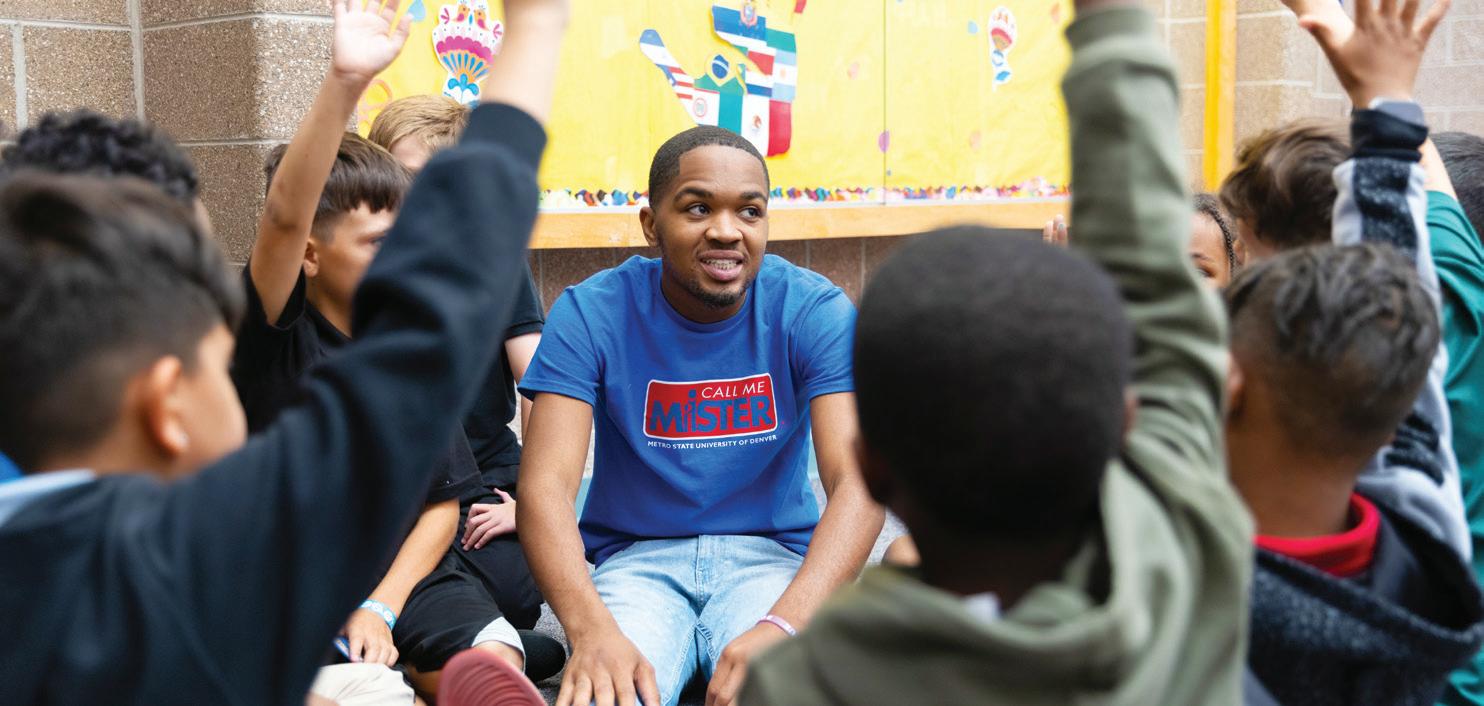

Launched in 2000, Call Me MiSTER now spans 12 states and includes over 500 MiSTERs. An essential part of their mission is to expose young students of color to educators who look like them. Just 1.3% of public school teachers were Black men in the 2020-21 school year, according to a 2022 National Center for Education Statistics report.
“This program will not only prepare great teachers; it will revolutionize education,” said Elizabeth Hinde, Ph.D., dean of the School of Education at MSU Denver.
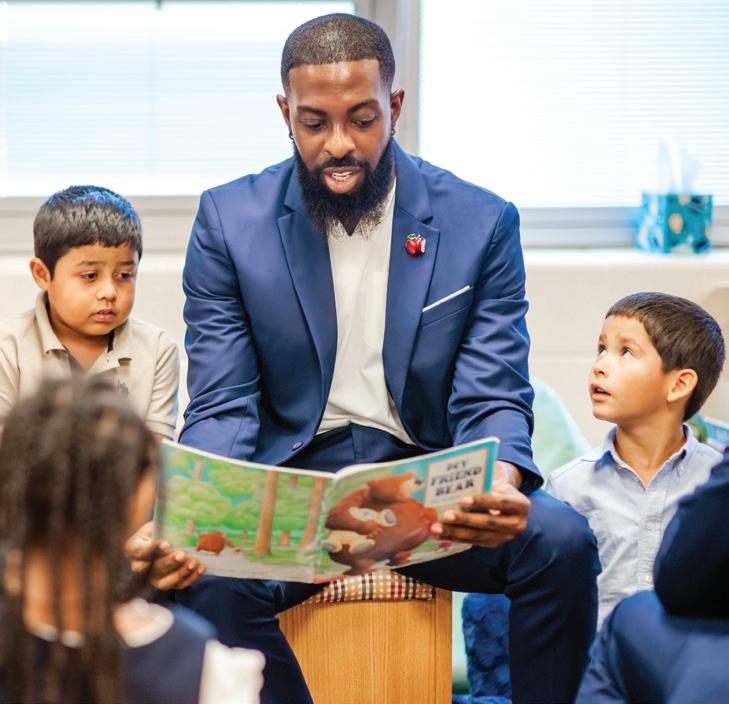
“To us, teaching
6 RED MAGAZINE | SPRING 2024 NEWS
AMANDA SCHWENGEL
IMMERSIVE LEARNING
ALYSON M c CLARAN
ALYSON M c CLARAN
above, clockwise from top: MSU Denver student
Joshua
Barringer works with students at Green Valley Elementary School; Program Director Rashad Anderson reads a story to a rapt class; Education undergraduate Jordan Puch tutors an elementary school student.
RASHAD ANDERSON, PH.D., ASSOCIATE PROFESSOR IN THE SCHOOL OF EDUCATION AND DIRECTOR OF THE CALL ME MiSTER PROGRAM AT MSU DENVER
is a calling.” —

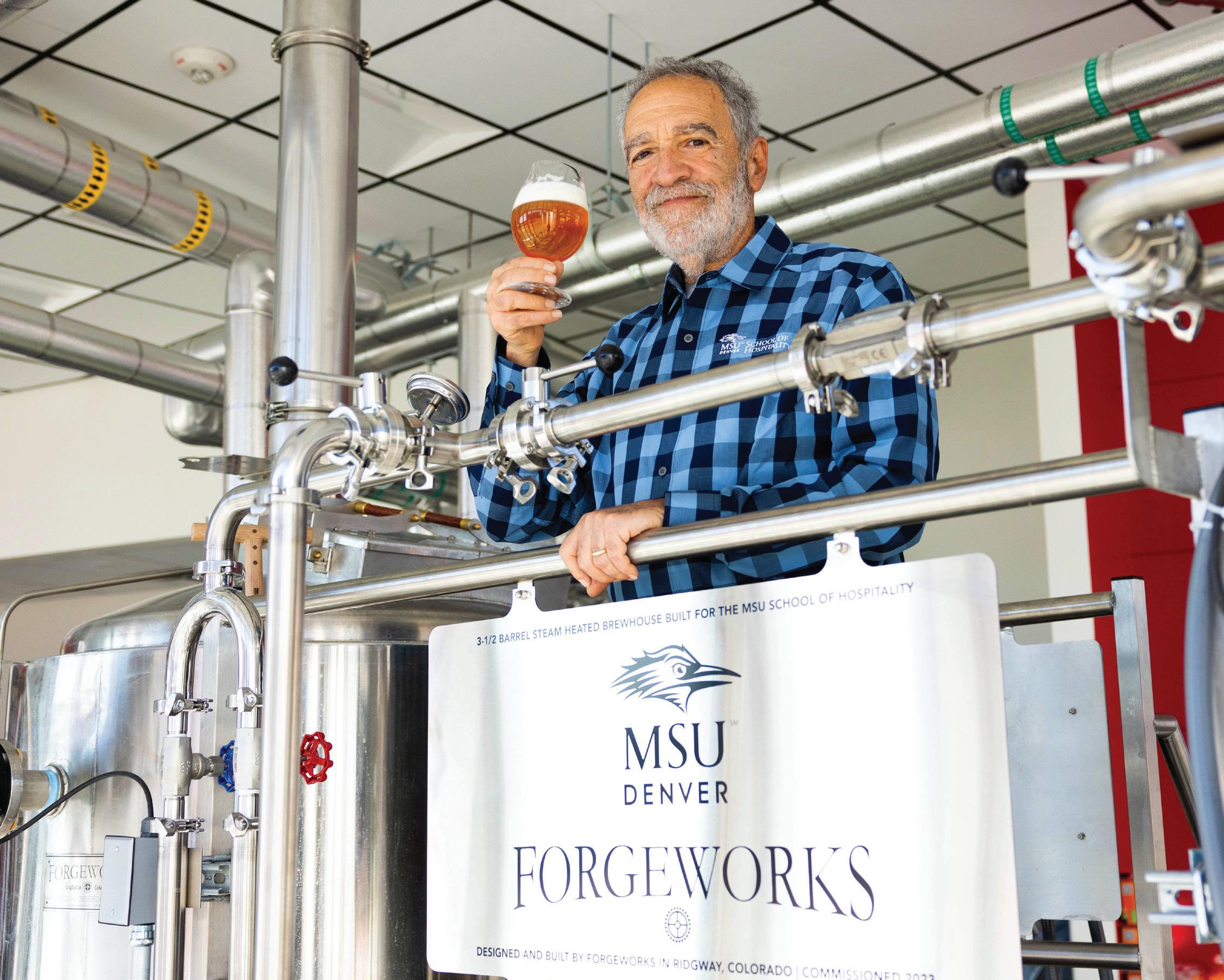
Student brews now on tap
Metropolitan State University of Denver recently raised a glass to its new brewing laboratory.
The Charlie Papazian Brewing Education Lab, named in honor of the craft beer pioneer, will provide students in MSU Denver’s Brewery Operations Program with an opportunity to brew on a commercial-scale system. It may also open the door to a new campus brewpub that sells student-made beer.
“(Students will learn) what the production process is all about and all of the management and operational things involved in the brewing industry,” Papazian said as supporters gathered to celebrate the lab’s opening last fall.
MSU Denver’s beer program already boasted a number of hands-on learning facilities, including smaller brewing systems. But students advocated for a facility that would let them brew on a commercial scale.
The 1,500-square-foot facility features the kind of 3½-barrel commercial brewing system used in many small to medium-size breweries. “It’s a much more professional setup, a much more
technical setup,” said Christopher Eastment, a senior majoring in Event and Meeting Management and minoring in Brewery Operations.
In addition to giving students skills that employers value, the new lab will “ethereally” connect them to a man whom many credit for starting the $28 billion craft-beer industry, Eastment added.
Papazian is the retired founder of the American Homebrewers Association and the Brewers Association, both based in Boulder. He began homebrewing in the 1970s — a time, he said, when the U.S. commercial beer industry “was in the dark ages.”
Today, there are 440 craft breweries in Colorado alone. The industry provides a $2.4 billion impact to the state’s economy, according to the Brewers Association.
Papazian was instrumental in galvanizing financial support for the new lab, including contributions from prominent Colorado brewers, restaurateurs and industry boosters.
SPRING 2024 | RED MAGAZINE 7
AMANDA SCHWENGEL
Craft beer pioneer Charlie Papazian in the MSU Denver brewing laboratory that bears his name. SUPPORT the lab.
Sustainable careers
Two transformative partnerships are preparing students at Metropolitan State University of Denver for success in the burgeoning green economy.
The University formalized a partnership with the Environmental Protection Agency’s Denver-based Region 8 office in September with the signing of a new Memorandum of Understanding (MOU).
Hsiu-Ping Liu, Ph.D., professor in the Department of Biology and director of the Center for Advanced STEM Education, said the MOU is an expanded renewal of a 2018 agreement. The partnership covers student internships and employment preparation, an outreach program that brings EPA personnel to campus, support for education and environmental student initiatives and collaboration on joint research.
Jason Morris is a beneficiary of the agreement. In 2008, he was hit hard by the Great Recession, leaving him with no job or home. Today, the first-generation college student is on the cusp of graduating with a degree in Biology.
Morris is an intern in the EPA’s Pathways Program for Students and Recent Graduates and aims to land a permanent job upon graduation. “The program is designed to segue you right into full-time employment,” he said, the prospect of which gives him hope.

MSU Denver has also recently formalized a partnership set to propel students into the world of sustainable energy. The University’s collaboration with the U.S. Department of Energy’s National Renewable Energy Laboratory dates to 2016. A new MOU, signed in November, solidifies the University’s commitment to providing students with valuable internship and employment opportunities.
NREL, a leader in sustainable-energy research, offers MSU Denver students a launching pad for careers. Alumna Zofia Tillman joined NREL as an undergraduate
intern while working toward her Chemistry degree. She stayed on as a graduate intern and was ultimately hired by NREL as a research technician. A year later, she became a researcher and is now the lead on nearinfrared spectroscopy for her group.
“The hardest part of any job search can be establishing your credibility,” Tillman said. “Getting my internship position at NREL gave me a vital foot in the door.”
The agreement will likely lead to more collaboration via internship opportunities, joint research and workforce development,
8 RED MAGAZINE | SPRING 2024
NEW PARTNERSHIPS NEWS
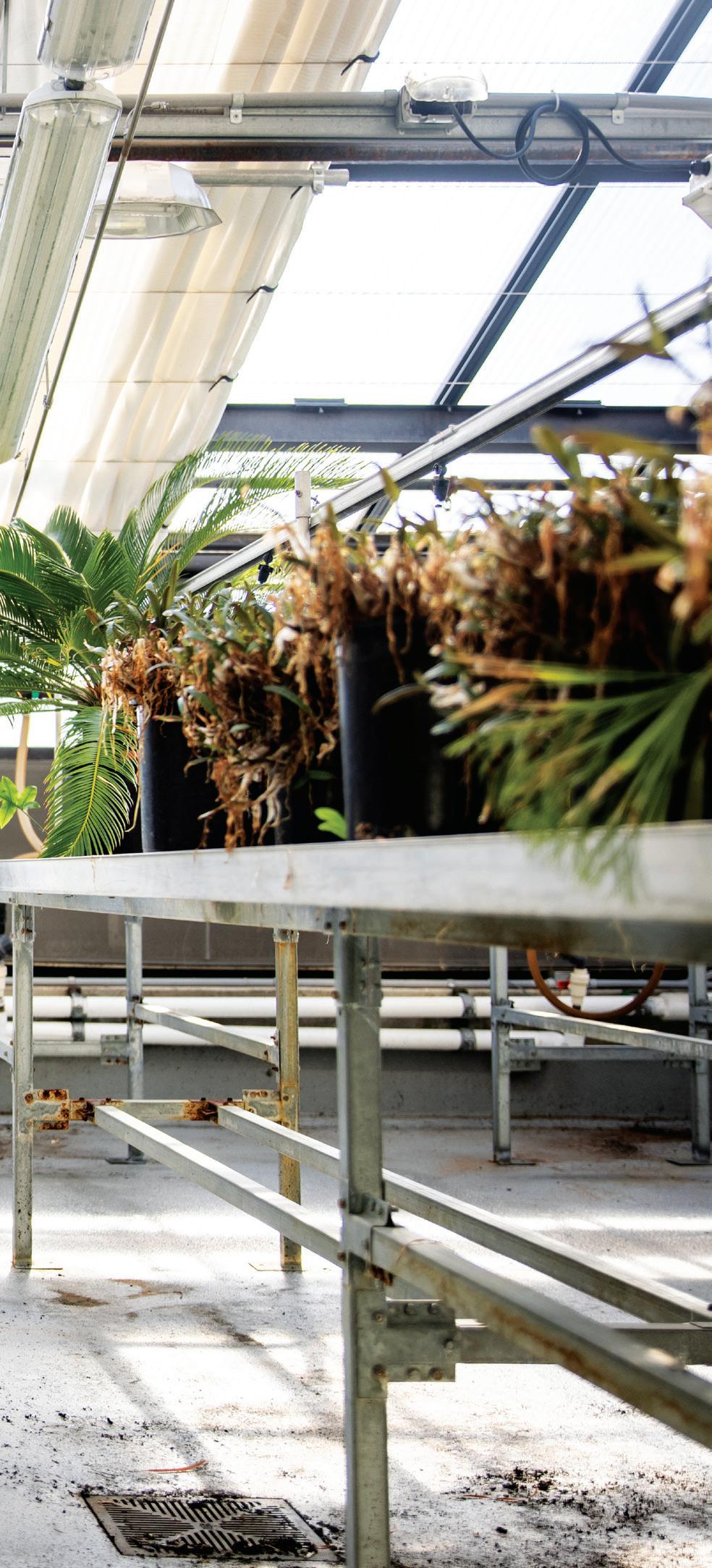
said Megan Lazorski, Ph.D., an assistant professor of Chemistry who holds a joint appointment with MSU Denver and NREL.
Whether through internships at the EPA or research opportunities at NREL, MSU Denver is not just educating STEM students; it’s shaping the future leaders of the sustainability workforce.
Seal of Excelencia
Excelencia in Education, a research organization focused on the higher education of Latino students, has certified Metropolitan State University of Denver with the Seal of Excelencia
MSU Denver was one of just nine universities nationwide to become newly certified in 2023, and it’s the only institution of higher learning in Colorado to earn the seal.

MSU Denver is the only institution of higher learning in Colorado to
the seal.
“There is a real difference between colleges and universities that enroll Latino students and those that intentionally serve them,” said Deborah Santiago, co-founder and CEO of Excelencia in Education. “Those that earn the seal are trendsetters on a journey of transformation.”
MSU Denver in 2007 launched an ambitious effort to obtain federal recognition for educating Latino students, who at that time made up about 13% of the University’s undergraduate population. MSU Denver was designated as a Hispanic-Serving Institution in 2019, and today more than 35% of its students are Latino.
“The seal ensures that we continue to sustain our commitment, that our policies and practices reflect our commitment and that academic and inclusive excellence are front-andcenter not only for our Latinx students but for all of our students,” said MSU Denver President Janine Davidson, Ph.D.
“Those that earn the seal are trendsetters on a journey of transformation.”
The Seal of Excelencia is given after a rigorous selection process. Members of the University’s HSI Task Force and Executive Steering Committee contributed to a yearlong application process. Manuel Del Real, Ph.D., executive director for HSI and Inclusion at MSU Denver, said the certification honors that work.
— DEBORAH SANTIAGO, CO-FOUNDER AND CEO OF EXCELENCIA IN EDUCATION
MSU Denver’s HSI designation has opened up millions of dollars in grant opportunities. Since 2022, associated grant funding has more than doubled. Because the funding bolsters broad initiatives, such as student support services, the designation allows the University to better serve all students.
SPRING 2024 | RED MAGAZINE 9
Biology student Jason Morris walks through the Science Building greenhouse at MSU Denver.
ALYSON M c CLARAN
earn
college
DOES A happier? degree MAKE
YOU

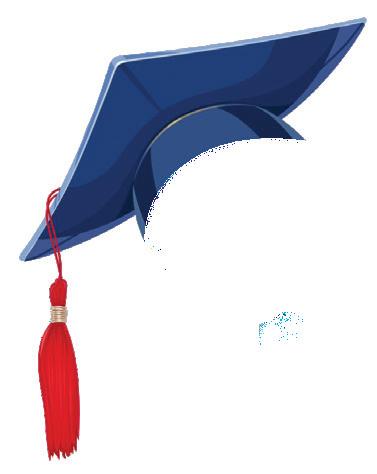


Psychologists trace the connection between higher education and subjective well-being.

10 RED MAGAZINE | SPRING 2024
STORY BY MICHAEL HAEDERLE / PHOTOS BY ALYSON M c CLARAN
PIXELIEBE & ALEKSANGEL/ISTOCKPHOTO.COM

ameer Fitch had a successful career as a computer analyst with plenty of seniority at his company when he graduated from Metropolitan State University of Denver in 2020 with a bachelor’s degree in Legal Analytics and Organizational Leadership.
It was the culmination of a 12-year educational odyssey that included stints at two other colleges and a couple of Navy deployments, and it brought a revelation.
“I had a high-achieving job,” he said. “But when I graduated, I was promoted. Without education, there’s an invisible ceiling that nobody sees until you’re actually there.”
Now, Fitch, 33, has earned his MBA (also at MSU Denver) and he has his sights set on law school. He also serves as a mentor to current and prospective University students, touting the importance of higher education. “There are two things in life nobody can take away from me: my bachelor’s and my master’s — and hopefully my J.D. when I’m done,” he said.
His determination to complete his degrees stands out at a time when Americans’ faith in the value and significance of postsecondary education appears to be waning.
A Gallup poll conducted last summer found that confidence in higher education stood at 36%, a sharp drop from 2018 (48%) and 2015 (57%). At the same time, there is robust evidence that people with college degrees are, on average, happier, healthier and more prosperous than those with less education.
Amid the apparent skepticism regarding the benefits of higher education, it’s worth asking what the relationship is between higher education and happiness. Does it really make people happier?
WHAT RESEARCH SAYS
“What we do see with education is you have fewer chronic worries, lower rates of depression and suicide and lower neuroticism,” said Aaron Richmond, Ph.D., professor in
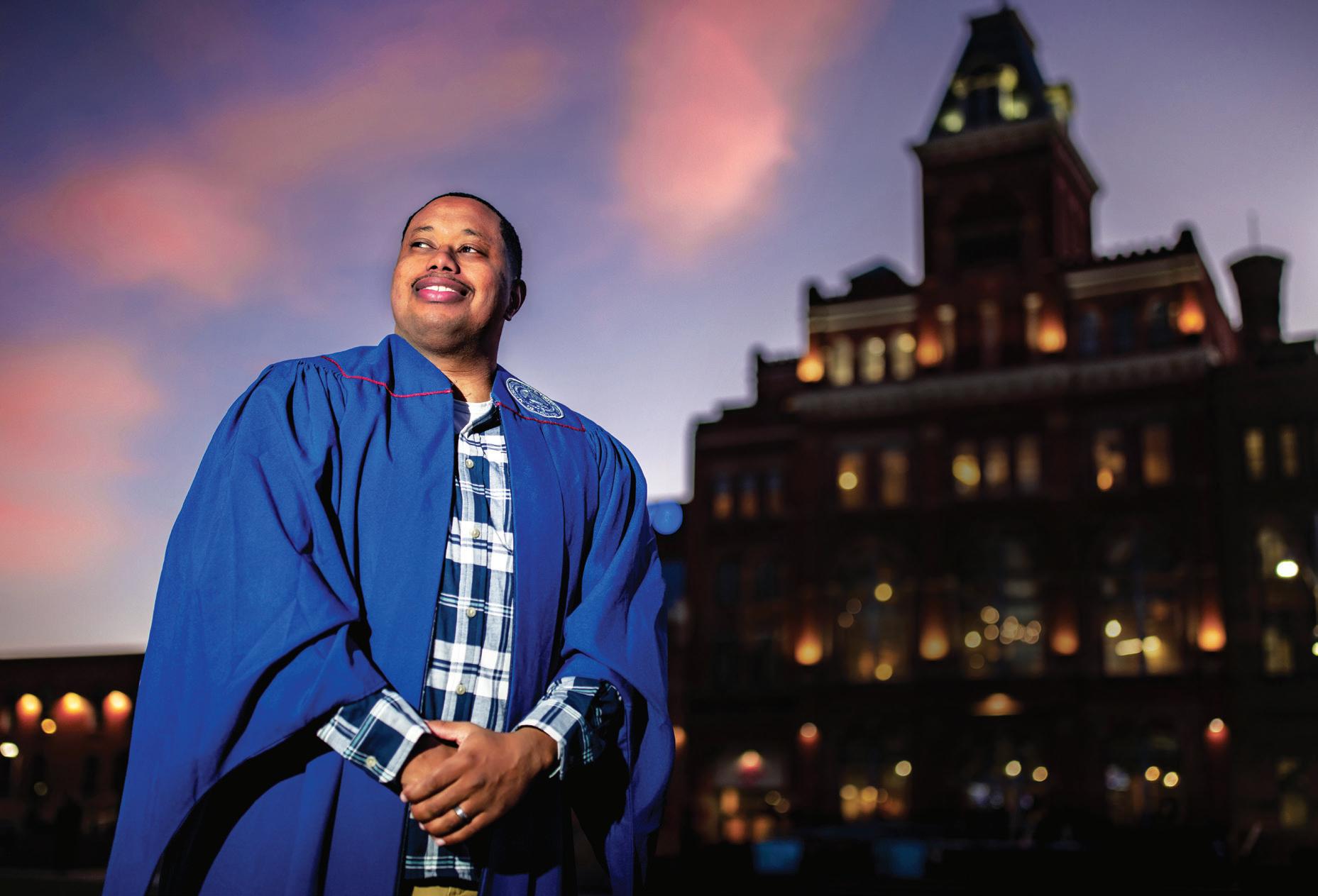
“Without education, there’s an invisible ceiling that nobody sees until you’re actually there.”
— JAMEER FITCH, MSU DENVER ALUMNUS
SPRING 2024 | RED MAGAZINE 11
the Department of Psychological Sciences at MSU Denver. He suggests the satisfaction that comes with completing a college degree involves a combination of factors.
“Psychologists use this term ‘subjective well-being,’” he said. “That’s things like life satisfaction, positive feelings and reduction of negative feelings. But there’s so many other things that go into it, like health factors and quality of life.”
In general, studies show that the higher a person’s education level is, the more subjective life happiness they have, Richmond said. But the relationship isn’t linear.
“Some research says there’s a period between 30 and 40 when we see the largest correlation between education and subjective life happiness,” he said. It may be that those with higher levels of education are more apt to have achieved their career and income goals by that point, leading to greater life satisfaction.
Subjective well-being also encompasses things like citizenship and positive social relationships, Richmond said. “Are you being a productive citizen of society? What we see is those with college educations are more likely to have those feelings than those without college educations,” he added.
There is a caveat, however.
Richmond emphasized that this research is primarily correlational, meaning higher education doesn’t necessarily lead directly to contentment. Higher levels of education generally translate into higher incomes, and while money may not buy happiness, it can buy experiences that promote happiness.
Cynthia Erickson, Ph.D., Richmond’s colleague in the Psychological Sciences Department, said the quality and affordability of a college education play an important role in predicting happiness.
Erickson cited data from the 2014 Gallup-Purdue Index Report, which surveyed more than 30,000 U.S. college graduates to gauge indicators of wellness and life satisfaction. Whether someone attended a large university or a small liberal arts school didn’t matter much. Nor did the school’s reputation or whether it was public or private, and grades were not a good predictor.
“What makes a difference is people feel like they have a professor who cares about them or who have engaged in some sort of project outside of class,” she said. “Those people report higher levels of well-being in the workplace after they leave college.”
Conversely, one thing that predicts lower levels of well-being is having more than $40,000 of student loans.
“If you leave college and you’re so stressed about your student loans, it’s hard for you to thrive,” Erickson said. “What happens when you have to choose between paying for
Grandma’s medicine, paying the rent or paying on your student loan? It’s a dilemma.”
REAL OUTCOMES
MSU Denver offers students a great value, she added, with professors who care about students and encourage them to follow their dreams and find their strengths.
Gabriel Trujillo can attest to the benefits of mentoring. Trujillo, 21, a fourth-year student majoring in Psychology with a minor in Spanish, started at MSU Denver in 2020, when the Covid-19 pandemic was raging.
During his first two years of college, Trujillo’s mother, Gabby, battled cancer before succumbing at age 50, leaving him and his brother Kevin, 28, to raise their two younger brothers, ages 10 and 13. “We knew we had to take care of our little brothers,” he said. “They didn’t have anyone else.”
Now, he takes the bus to the Auraria Campus from their home in Colorado Springs. It requires considerable time management, but he feels it’s worth it.
“Education is very much a privilege,” Trujillo said. “I’ve learned so much more, not just from my classes but also how to work with people, how to talk to people, how to communicate. I really do see that there’s a lot of potential that comes from getting an education.”
He and his older brother are passionate about encouraging their younger siblings in school. They want their little brothers to get through middle school and high school and would love for them to go to college or at least give it a try.
The pair are also fulfilling a promise they made to their mother. “Before she passed away, she made my brother and me promise that we would continue with our education as well,” Trujillo said. “I would say 100% it’s made me happier.”
Fitch, the law-school hopeful, acknowledges he struggled for a time to complete his studies at MSU Denver. “I could not find the mental tools; I did not have the background,” he said. “I did not know how to cross the finish line at that time.”
But something changed on a deployment to Bahrain.
“I met with many people who were successful — doctors and lawyers,” he said. “I had a self-discovery moment and realized I wanted to be a lawyer.” But first, he needed to complete his bachelor’s degree. With a goal to motivate him, he came back from deployment with a different mindset.
For Fitch, the experience of completing his degrees speaks for itself. Walking across the stage to receive his bachelor’s diploma in the midst of the Covid-19 pandemic “was an eyeopening experience for me and my family,” he said. “It has made me extremely happy.”
12 RED MAGAZINE | SPRING 2024

“I would say 100% it’s made me happier ”

— GABRIEL TRUJILLO, PSYCHOLOGY STUDENT AT MSU DENVER
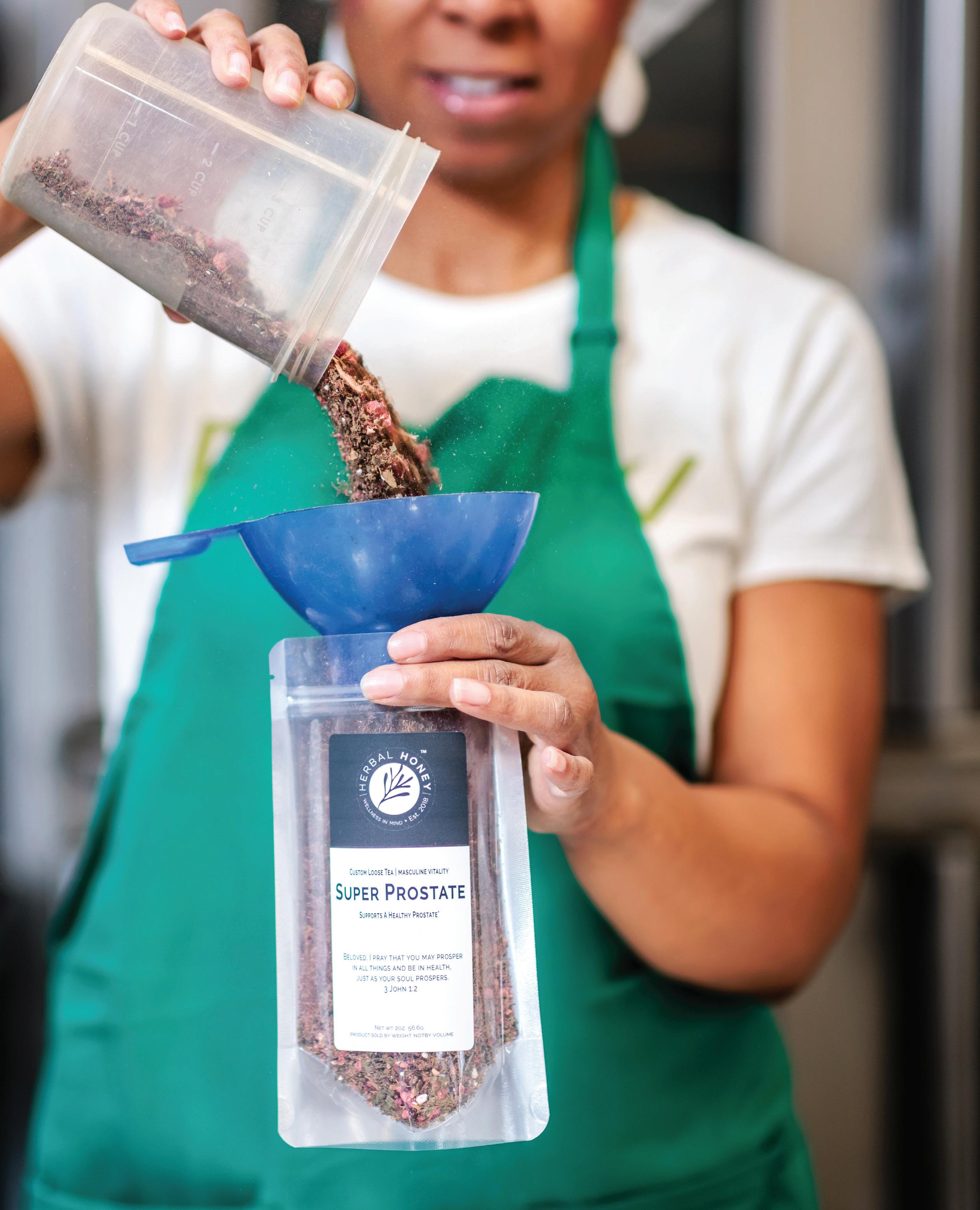
Fueling a food revolution for good health
MEET THE WOMEN BUSINESS LEADERS CREATING A STIR IN THE FOOD-AS-MEDICINE MOVEMENT.
STORY BY AMANDA LOUDIN > PHOTOS BY ALYSON M c CLARAN

As a child, Keisha Mathes worried a good deal about her mother, who spent years in and out of hospitals for ulcerative colitis. But it wasn’t just the colitis that plagued her mother. The suffering was compounded by treatments doctors prescribed, many of which caused allergic reactions.
While her mother has been in remission for 20 years, the experience left a lasting impression on Mathes, leading to her path of study and, ultimately, her own business. Mathes, who has a degree in Integrative Therapeutic Practices from Metropolitan State University of Denver, created Herbal Honey in 2018. She whips up healing herbal solutions that help customers maintain wellness.
“My philosophy is that these formulas don’t replace traditional medicines but complement them,” the 2014 graduate said. “There are benefits to each, and this is a marriage of the two.”
Herbal Honey is representative of a growing food-as-medicine movement, as is GoodLove Foods, a company that specializes in frozen, gluten-free, ready-to-bake items. GoodLove founder Chennelle Diong is also an MSU Denver graduate, having attained a degree in Hospitality in 2016. Both alumnae credit their experiences at the University with allowing them to launch their thriving companies.
TURNING AN IDEA INTO A BUSINESS
Mathes’ journey to business owner began at MSU Denver, where she gained a deep well of knowledge about herbs and botanical formulations.
“These formulas don’t replace traditional medicines but complement them.”
—
Prior to that, however, she was already tinkering with healing formulas for friends and family members. “I developed my first formula in 2008, and from there, more people started asking about them,” she said.
Most of Herbal Honey’s products are loose-leaf teas made from standard formulas — one for men and one for women. But Mathes also customizes blends for customer needs and offers herb-infused honeys in season, as well as herb-infused body products.
As with Mathes, the germ of Diong’s business came in response to a loved one’s health struggles. In this case, Diong started toying with gluten-free baking because her then-boyfriend, who is now her husband and business partner, suffered from celiac disease.
“I grew up in a Filipino American home that was very food-based, but I had no idea how big of a deal it was for people with celiac to find safe foods,” she said. “It’s mentally and physically draining.”
Diong began baking gluten-free concoctions and along the way noticed she felt better eating gluten-free. She got tested and learned she also had the markers for celiac, thus planting the seeds for GoodLove Foods.
“I wasn’t all that serious about the business to start and

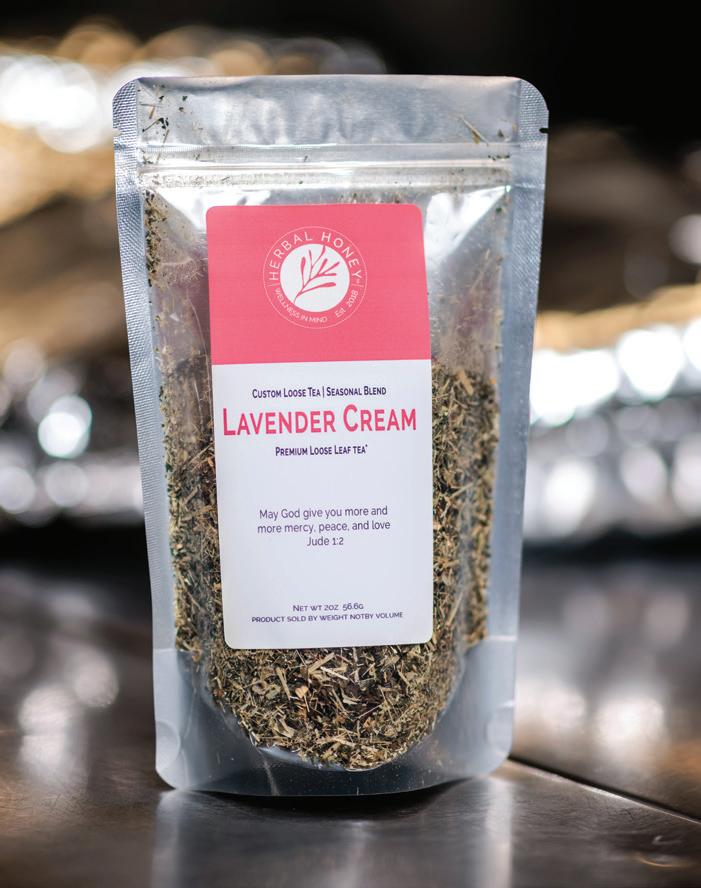 MSU Denver alumna Keisha Mathes is the owner of Herbal Honey, a business focused on wellness through medicinal herbs.
Lavender Cream is one of Herbal Honey’s seasonal tea blends.
KEISHA MATHES, MSU DENVER ALUMNA
MSU Denver alumna Keisha Mathes is the owner of Herbal Honey, a business focused on wellness through medicinal herbs.
Lavender Cream is one of Herbal Honey’s seasonal tea blends.
KEISHA MATHES, MSU DENVER ALUMNA


had no idea it would grow into what it is today,” she recalled. After completing an MBA to further her business acumen, Diong “got the itch” to formally launch, and GoodLove was off and running.
FOSTERING ENTREPRENEURSHIP
Rachel Sinley, Ph.D., department chair and professor of Nutrition at MSU Denver, defines food-as-medicine as “the concept that nutrition and access to healthful foods, and foods specific to a condition, are rights we have as part of health care.” Too often, Sinley said, access to good food and education is considered a privilege rather than a public health issue.
MSU Denver’s Nutrition program includes courses to help students deliver medical nutrition therapy. “They learn community nutrition to apply these principles to larger groups and populations,” Sinley said. “We’re arming them with the tools to develop tailored nutrition.”
Sinley sees the businesses developed by Mathes and Diong as illustrative of the food-as-medicine movement because they create access to affordable food products that make a specific health impact.
“Herbal Honey is a great example of taking foodstuffs that we don’t think of as therapeutic and creating an opportunity to integrate them into a broader healthy lifestyle,” she said. “GoodLove is a great example of taking initiative with celiac and creating food that tastes good because it doesn’t become nutrition until you eat it.”
Sinley noted that MSU Denver encourages an entrepreneurial spirit, providing a lens through which students of all strokes can think about gaps in society and turn potential solutions into businesses that serve the public.
Becky Prater, senior lecturer in Entrepreneurship at MSU Denver, added that the University’s Entrepreneurship program is specially designed to teach the nuts and bolts of business ideation and feasibility. “We ask them what their ‘why’ is and whom they are serving,” she said. “Then, we look into whether there’s a market for

Chennelle Diong, an MSU Denver graduate, is the founder of GoodLove Foods, which specializes in frozen, gluten-free, ready-to-bake items.
their idea, where the money for it comes from and what the business structure might be.”
The Entrepreneurship track is available as a minor and a major and soon as a certificate program, too. Prater emphasized that students with dynamic business ideas from a variety of majors take entrepreneurship classes.
A PITCH FOR HEALTH
In addition to teaching students in MSU Denver’s College of Business, Entrepreneurship professors coach students in the annual Denver Startup Week pitch competition.
Mathes and Diong successfully participated in the contest last year. Mathes made it to the semifinal round, while Diong took home the grand prize, a $48,000 package to help grow her business.
“It’s because of my time at MSU Denver that I was able to realize my full potential,” Diong said. “I want to think my story is unique, but really what I noticed at the University, especially in the School of Hospitality, is that we were all there to find our purpose.”
When Mathes looks back on her time at MSU Denver and its role in shaping Herbal Honey, she feels appreciative, especially for the school’s flexibility. As a working mom of eight children, her options were limited, but the University accommodated her tight schedule.
“I stumbled onto my herbal healing class, and I was hooked,” she said. “If I had known then that I would be a business owner one day, I would have definitely taken additional courses in entrepreneurship.”
Even without that enhanced learning, Mathes is poised for big things. She sells Herbal Honey products through her website, at local markets and also through big retailers such as Amazon, Walmart and Kroger. And she has done it all without hiring anyone except for her kids.
Diong is looking ahead to business growth as well and is gearing up to widen her product distribution. “The business traction is really steady and compounds every month,” she said. “When I can finally use my pitchweek prize, I’m hoping it will get us to the next level.”
SPRING 2024 | RED MAGAZINE 17
MSU DENVER DANCERS LEAD CLASSES TO HELP KEEP OLDER ADULTS ON THEIR TOES.

Senior movement
RESIDENTS AT TWO DENVER-AREA assisted-living facilities have been busting a move in the quest for better health, thanks to weekly classes led by students and faculty members from the Dance program at Metropolitan State University of Denver.
Senior lecturers Nicole Predki and Leslie Merrill Schmidt, co-coordinators of the University’s Dance program, said dance is an ideal health-promoting activity for older adults because it taps into different brain regions, promotes neuroplasticity and helps protect against dementia.
STORY BY MICHAEL HAEDERLE
PHOTOS BY ALYSON M c CLARAN
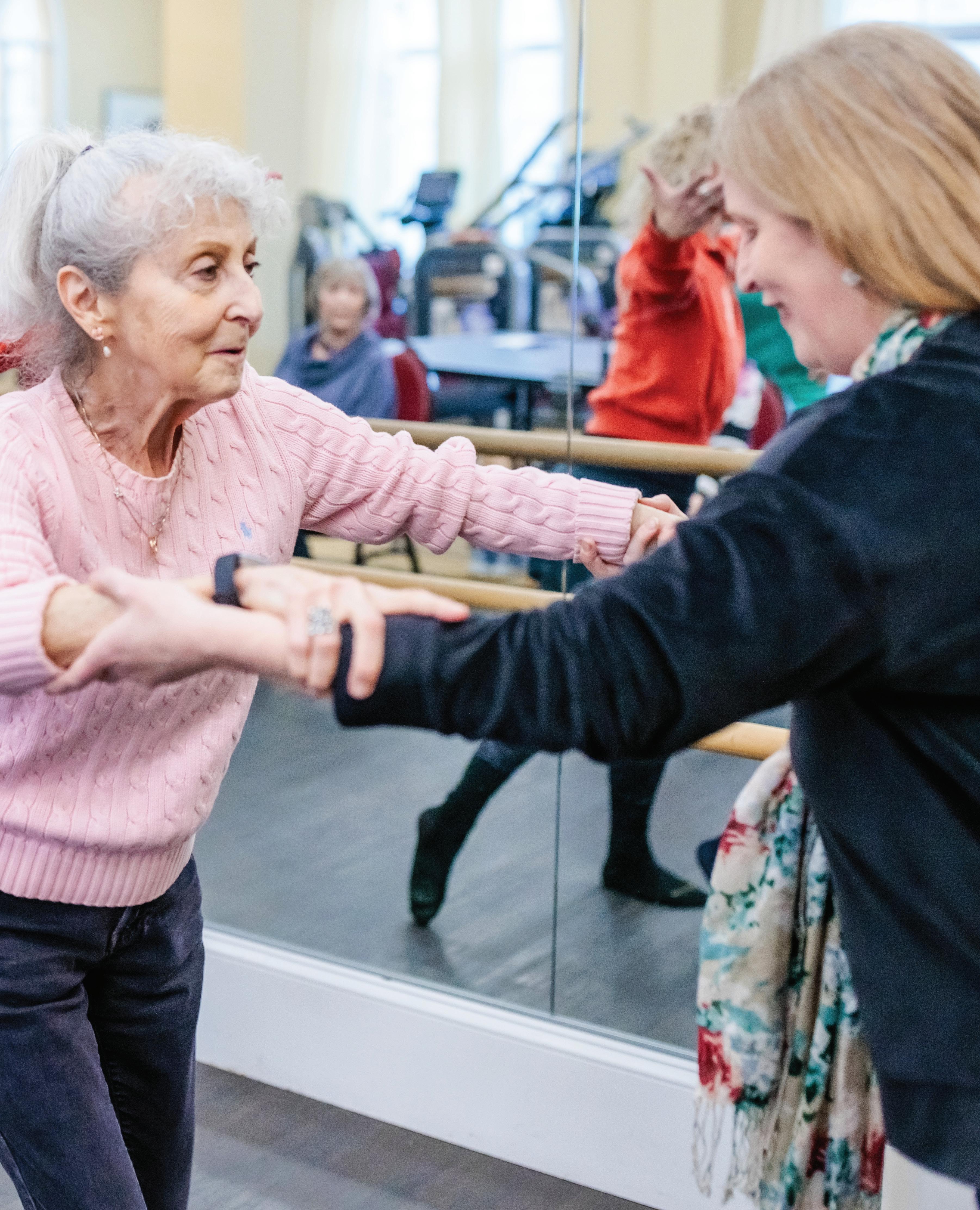 Nicole Predki, left, and Leslie Merrill Schmidt, right, co-coordinators of the MSU Denver Dance program, lead Ronnie Sherman through her steps at Balfour Senior Living.
Nicole Predki, left, and Leslie Merrill Schmidt, right, co-coordinators of the MSU Denver Dance program, lead Ronnie Sherman through her steps at Balfour Senior Living.

“The thought is that it strengthens neuronal connections but also builds new connections because you’re using all these different parts of your brain,” Predki said. “I like to think that we’re just constantly building those connections when we’re dancing.”
Predki and Schmidt have taken turns delivering weekly dance and movement classes at a Balfour Senior Living facility near the Auraria Campus for the past couple of years. And last summer, Schmidt led MSU Denver students through a 13-week summer field experience at Park Hill Residence, which is operated by the nonprofit Senior Housing Options and provides subsidized and affordable care to older adults and those living with disabilities.
“We met for an hour and a half every week,” Schmidt said. “It was an intergenerational exchange between the students and the residents at Park Hill. And it turned out to be very successful.”
STUDENTS TAKE THE LEAD
Schmidt and her students had the residents explore basic movement patterns that are learned early in life and connect the brain to the body. Schmidt said revisiting these patterns has been shown to benefit older adults and adults with disabilities.
The Park Hill residents were guided through breath patterns and scripted movement exercises meant to reinforce that connectivity. A key objective in working with the residents was enhancing their somatic awareness, which involves consciously tuning in to internal body sensations and experiences, Schmidt said.
She noted that the focus on connecting with internal sensations is a departure from the way dance is usually taught. “In traditional dance studies, there’s a really strong focus on the outward appearance of the movement,” she said, “and certainly that’s something that’s
important and we have to train for.
“But equally important is to be able to connect into what is our internal feeling and sensation and how can that then be externally expressed. So rather than trying to make the perfect picture with the body, we’re working with sensing, feeling and that place of imagination and play.”
Each week, Schmidt and her students asked the residents to focus on a different body part, paying attention to proprioception — the sense of where the body is in space. They also explored the stories that might be associated with different parts of the body. Feet and legs, for example, could be connected with grounding, taking a stand or making a path through life.
The residents were then encouraged to draw that body part and complete some creative and reflective writing in response to certain prompts. Later on, they developed group poems and a group dance that was recorded on video.
The summer field experience appears to have benefited the MSU Denver students as much as it did the Park Hill residents. Thenfourth-year student Nohealani Rufo was so taken with the process that she wound up continuing her engagement with the residents for her senior project.
Rufo, who was raised in Hawaii, ran a “Love Your Body” workshop series this past fall based on Native Hawaiian hula movements. “(The theme) was ‘cherishing the body that you have’ because it’s the only one that you have,” she said. Most of the series was conducted with the residents seated in chairs to ensure that everyone could participate.
While it took some time to get to know the residents, who ranged in age from 70 to 90, Rufo said it was incredible to see them “light up” when they learned about her culture, including some ghost stories and local legends.
20 RED MAGAZINE | SPRING 2024
Nicole Predki, right, senior lecturer at MSU Denver, supports Judy Striber at a dance class at Balfour Senior Living. facing page: Leslie Merrill Schmidt, right, co-lead for the University’s Dance program, enjoys time with residents.

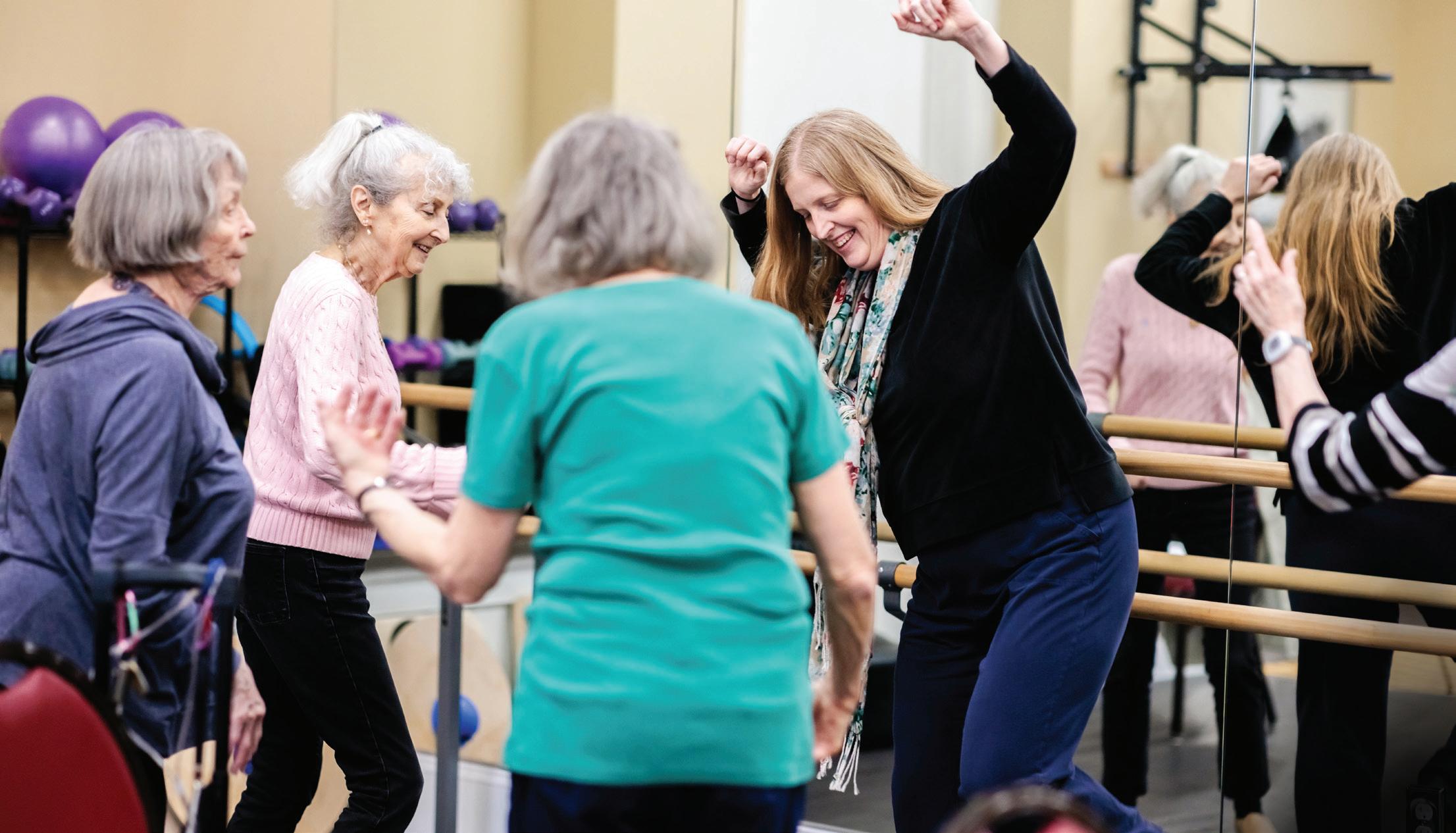
From one week to the next during the workshop series, Rufo found the residents could recall the movements they had previously practiced together. “Movement is much easier to memorize, as opposed to doing anything scholastic,” she said.
Prior to her graduation in December, Rufo had worried about finding a job, but then an unexpected opportunity presented itself.
She was given the chance to apply for an activities coordinator position at Park Hill Residence. She started in January. “I told the residents, and they were really excited,” she said.
BRAIN MOVEMENT
“[Dance] reduced the rate of dementia by 76% in those who participated.”
— NICOLE PREDKI, CO-LEAD OF THE DANCE PROGRAM AT MSU DENVER
Predki and Schmidt continue to offer hourlong sessions at Balfour in different dance styles. Predki leads the first half with ballet and jazz, then Schmidt does ballet and tap. The classes are held in a small dance studio with mirrored walls and a barre.
Predki, who worked in science laboratories as an undergraduate, is fascinated by neuroscience research suggesting that dance and creative movement may ward off dementia. She cited a 2003 study from the Albert Einstein College of Medicine, which tracked the leisure activity of almost 500 people living in an elder-care facility.
The researchers categorized some activities, such as reading or doing crossword puzzles, as cognitive and others, including dance and playing tennis, as physical. They followed the cohort over a number of years to see who developed dementia symptoms.
“They did show that crossword puzzles and some of those things had an impact,” Predki said, “but none of the physical activities did, except dance. It reduced the rate of dementia by 76% in those
who participated. It was a surprise because nobody’s really studying dance, which is relegated to this small box of ‘entertainment.’”
Predki also noted a 2008 study in which researchers conducted neuroimaging studies of amateur tango dancers and found that certain brain regions were unusually active. “It was the motor cortex, the somatosensory cortex, the basal ganglia and the cerebellum,” she said. “All of those together. You’re working on that executive function, long-term memory and spatial awareness.”
Other research has shown that movement through dance helps people living with Parkinson’s disease. Predki has witnessed how talking and moving to a structured rhythm can help those with the disease move better.
Learning new dance steps is also a feat of memory. “You have to memorize (the steps) for yourself, but then you’re also responding to your environment, you’re responding to rhythm, you’re responding to sound,” she said. “And you’re also responding to the people you’re dancing with.”
Dancing is known to release serotonin, the “feel-good” neurotransmitter in the brain, and improve overall physical fitness.
“With an aging population, you’re having fun, you’re having a community experience, you’re not being judged, you’re in an inclusive community and you’re working on these very important physical skills,” Predki said. “If we can improve balance and flexibility and strength and improve gait, you’re building balance confidence, and that helps people as well. I just can’t understand why we’re not dancing all the time.”
SPRING 2024 | RED MAGAZINE 21
SEE the dancers in action.
QUEEN OF FIVE POINTS
Fathima Dickerson is a familiar face in Five Points. A stunning mural in the Denver neighborhood depicts her visage surrounded by the phrases “food for the soul” and “heart of Five Points.” It’s a celebration of her contributions as co-owner of the historic Welton Street Cafe.
As Dickerson prepares to reopen the cafe at a new location, she can’t help but reflect on its journey. “This is more than just a restaurant; it’s about saving a community,” she said. “This isn’t about me, it’s not about my family, it’s the fact that we are in a historically Black district and everything is gone.”
YOU CAN FIND ALUMNA
FATHIMA DICKERSON AT HER FAMILY’S WELTON STREET CAFE, BRINGING COMFORT AND CARE TO HER COMMUNITY.
Opened by Dickerson’s parents, Flynn and Mona, Welton Street Cafe is one of the oldest remaining Black-owned businesses in Five Points. When the family had to close the restaurant in 2022, the community rallied to raise money to help it relocate down the block.
Fathima Dickerson called the move a rebirth. The larger space will improve the restaurant’s capacity, and serve as home to a nonprofit that provides resources to community members.
Dickerson’s life has long centered around keeping her family’s restaurant solvent. Now, as co-owner, she is also charged with keeping the cafe’s legacy alive. She is proud of how far she has come, not only as a figure in her community, but as a strong Black woman, or SBW, who had to find herself after feeling lost for many years.
She began to explore her identity as an SBW at Metropolitan State University of Denver, where she enrolled in 2005 and began a journey of self-discovery. “Education was my savior,” the 2010 graduate said. “It helped me figure out who I am and who I am not.”
These days, Dickerson stands on the cusp of a new stage. She is one of the most recognizable faces in Five Points, and not just because of the mural. She is a comforting presence in the community.
“When you think about the Black faces that we have across the states, we’re either celebrating people through tragedy or trauma,” she said. “We’re not celebrating these Black bodies for the positive impact they’re having in our communities. Instead of people asking ‘Who was she?’, I’d like people to ask ‘Where can I find her?’”

22 RED MAGAZINE | SPRING 2024 STORY KEYLEN VILLAGRANA | PHOTO ALYSON M c CLARAN
The “Queen Fathima” mural was created by artists Jodie Herrera and Miles Toland.
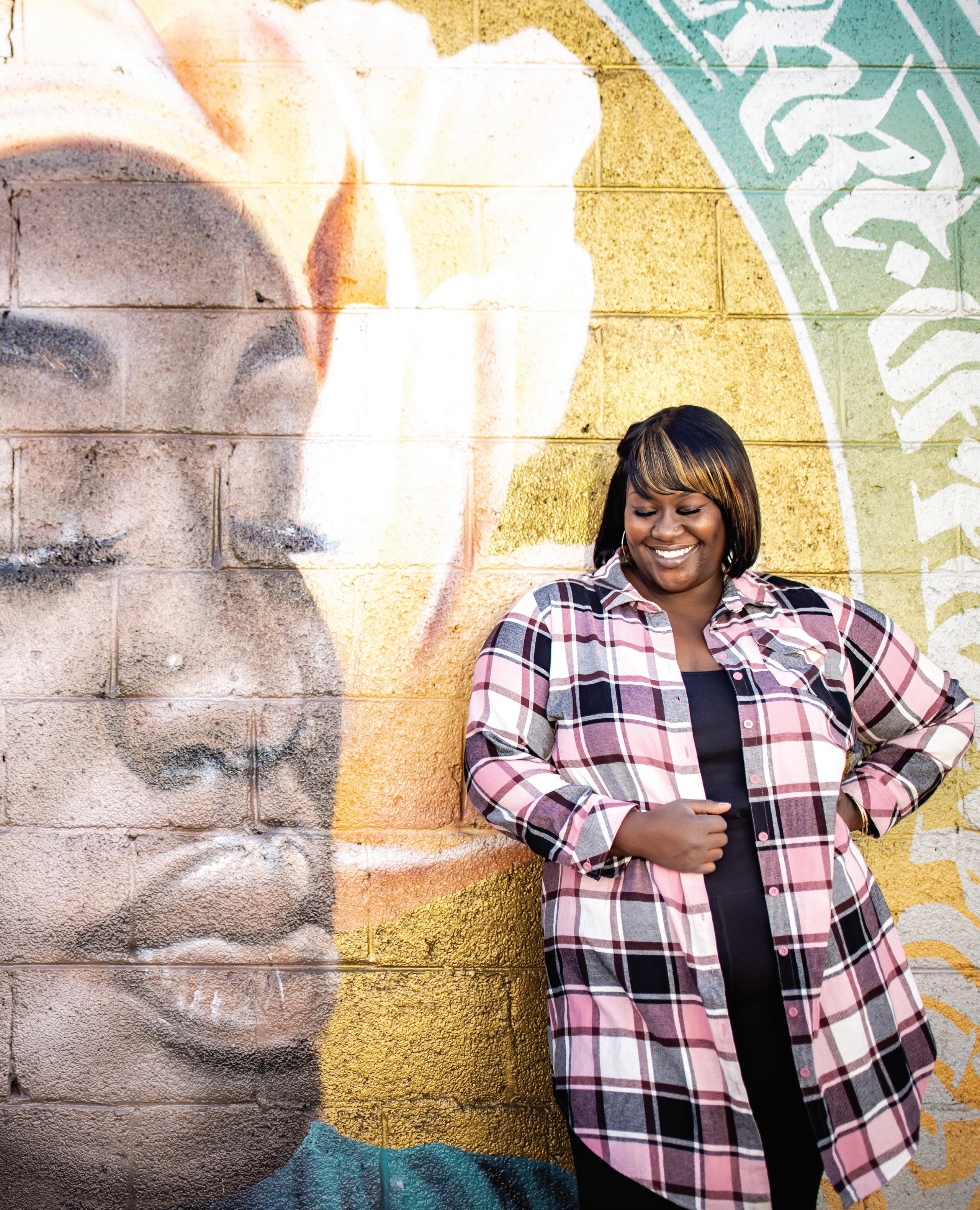
PORTRAIT
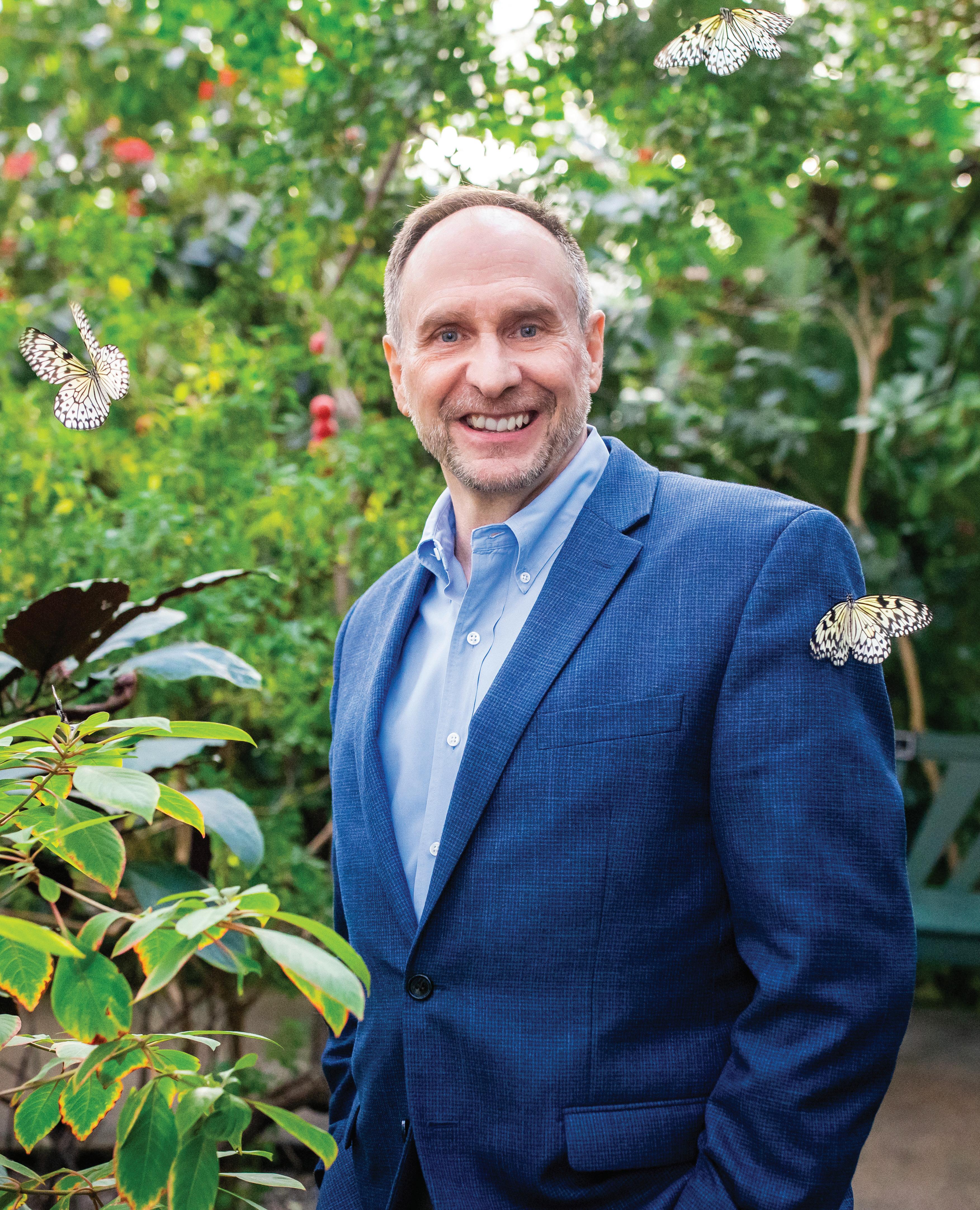
PORTRAIT

BUTTERFLY EFFECT
Wildlife lovers, here’s some trivia: Invertebrates, which are animals without a spine, account for more than 97% of all living animal species. From insects to jellyfish to sea urchins, these often-overlooked animals are everywhere.
Patrick Tennyson, president and CEO of Butterfly Pavilion in Westminster, said invertebrates play a pivotal role in nature and are essential to our survival.
ALUMNUS PATRICK TENNYSON’S COMMITMENT TO CONSERVATION HINGES ON AN UNLIKELY SET OF HEROES: INVERTEBRATES.
“Their unique ability to thrive in extreme conditions and contribute to ecosystems’ balance holds an untapped potential for solving a multitude of environmental challenges that humanity faces,” he said.
Tennyson would know. He has dedicated his career to environmental conservation, with over 30 years in leadership, administration and strategic planning roles. He earned his B.S. in Biology with a Zoology emphasis from Metropolitan State University of Denver in 1995. This past year, he won the 2023 Conservation Award from the philanthropic nonprofit Westminster Legacy Foundation.
Tennyson’s work at Butterfly Pavilion has further fueled his commitment to preserving the environment. And environmental concerns are, unfortunately, widespread in Colorado. “Issues such as water scarcity, habitat loss, wildfire management and climate change resilience are very concerning topics,” he said.
How does a butterfly conservatory impact conservation? Tennyson points to the concept of “a zoo within a zoo.” This, he said, underscores the significance of native insect habitats within larger animal habitats.

“Understanding and nurturing these microhabitats is vital,” he said. “They support local biodiversity, contribute to ecosystem health and educate the public about the interconnectedness of all life forms.”
That understanding is especially critical for those interested in careers in environmentalism or conservation.
Nearly three decades after graduating from MSU Denver, Tennyson said his educational experience at the University was “incredibly formative.”
His advice to aspiring zoologists or wildlife biologists is to immerse themselves in fieldwork, internships and research opportunities to gain a holistic understanding of the field. And he encouraged them to stop at nothing because the environment deserves passionate leaders.
“Environmentalism and conservation aren’t just careers,” he said. “They’re commitments to preserving our planet for future generations.”
SPRING 2024 | RED MAGAZINE 25
STORY MONICA PARPAL STOCKBRIDGE | PHOTO ALYSON M c CLARAN
CORONER YOU CAN COUNT ON
Raeann Brown didn’t intend to be a coroner.
When she started at Metropolitan State University of Denver in 2000, she chose to major in Chemistry, which would have led her down a different career path. But fate intervened.
Her father died during her first year at MSU Denver, and she was devastated by the way she was treated by the coroner’s office in another state. Upon returning to college, Brown changed her major to Biology with a minor in Criminalistics, and she committed herself to death investigation.
“I made a personal vow to never treat any family the way I’d been treated,” she said. “And I’ve kept my word for 20-plus years.”
While she has excelled in her profession, Brown didn’t get to finish her degree until recently. She’d left MSU Denver in her senior year to jump into her career, and a demanding and variable schedule had made it difficult to attend the upper-level science classes and required labs. But with more online offerings in recent years, she was able to graduate in 2022, and credits the University for accommodating the unique needs of nontraditional students.
Brown also reached another milestone in 2022: She was elected Douglas County coroner after 19 years of providing end-of-life care. The nature of her work demands a hardy constitution, and she thrives in the challenging environment.
ALUMNA RAEANN BROWN
WORKS WITH THE DEAD BUT STAYS FOCUSED ON TAKING CARE OF THE LIVING.
“I love a puzzle,” she said. “I love human anatomy. I love the criminalistic elements of the work, and I have strong discipline and focus from my past military experience.”
When she goes to a death scene, Brown always remembers: This is someone’s loved one. But she also needs to take a clinical and investigative view to speak up for the deceased and help write the last chapter of their story.
While Brown’s job may sound macabre, she performs a valuable societal role, helping to bring closure to people who have lost someone. And that’s important to the coroner and her team. “Our office motto is: ‘We speak for the deceased but also take care of the living,’” she said.

26 RED MAGAZINE | SPRING 2024 STORY MARK COX | PHOTO AMANDA SCHWENGEL

PORTRAIT
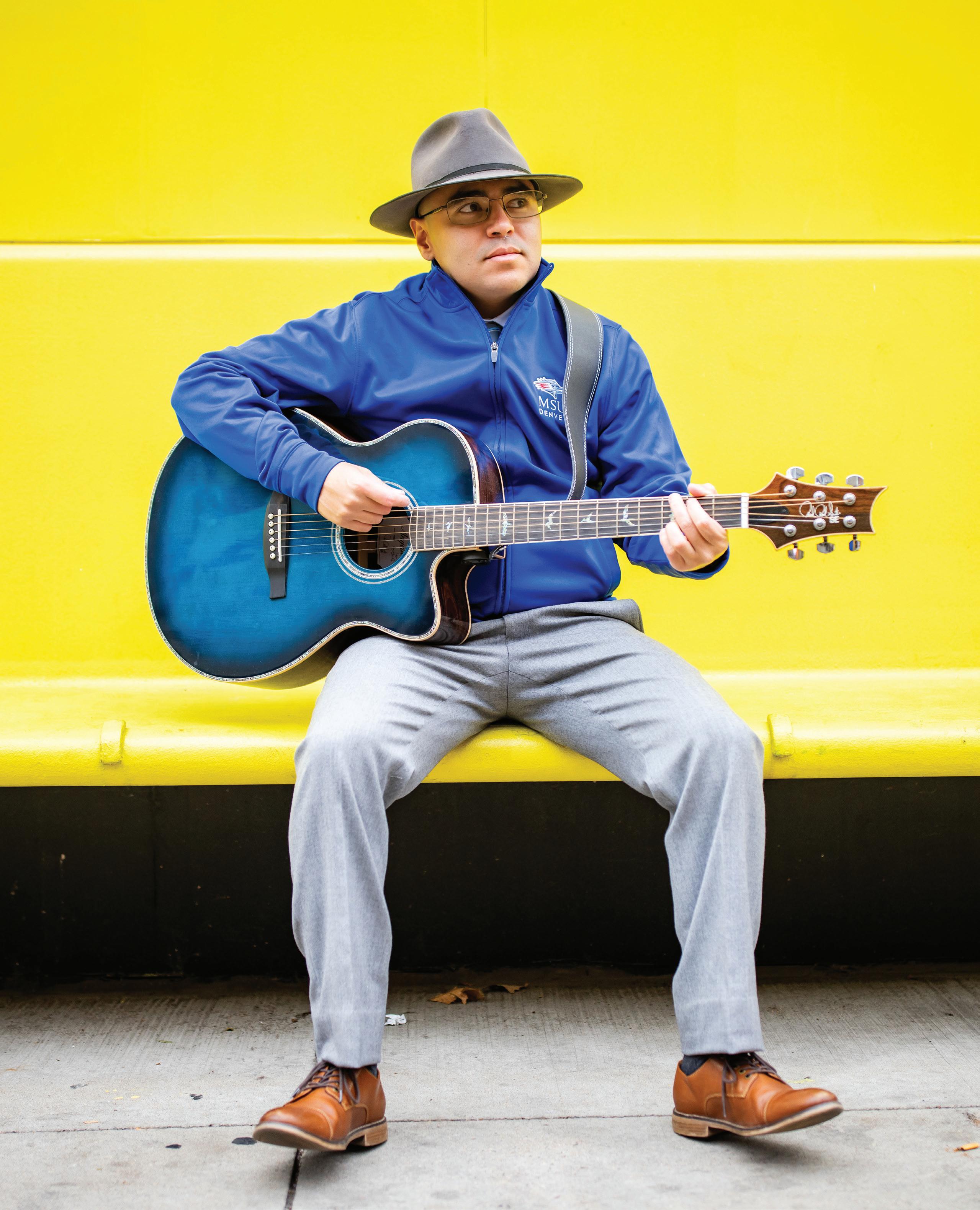
PORTRAIT

ALUMNUS JUSTIN GUY TURNED HIS LIFE AROUND TO PURSUE SERVICE TO OTHERS.
RESILIENCE REWARDED
Justin Guy had no plans to apply for the President’s Award at Metropolitan State University of Denver.
“My teacher thought I should share my story with the world,” he said. And what a story it is.
After overcoming homelessness, Guy earned his associate degree and transferred to MSU Denver. In no time, the History and Biology major was not only interning at the History Colorado museum but winning its 2022 Volunteer of the Year award. He graduated in December and received the President’s Award, the University’s highest student honor.
Yet his prospects didn’t always appear so promising. He grew up in a Denver neighborhood rife with gang violence, began using drugs and eventually left high school.
That was around the time he read “The Secret,” a book that sparked what would become a lifelong interest in personal growth and service to others. His first step on that path was the goal of enriching people’s lives through music, despite having never played an instrument. He lived in Hawaii at the time and dedicated himself so completely to mastering the guitar that he wound up homeless. He soon found himself facing a misdemeanor charge for allegedly violating local anti-panhandling laws.
To Guy, these laws were an injustice to the homeless community as well as a violation of the First Amendment. So he fought back. He contacted the American Civil Liberties Union, and in 2014 the county laws against solicitation were repealed.
Guy returned to Colorado with a new goal. Some of his fondest childhood memories were of visiting museums, and he was determined to work in one. After starting at MSU Denver, he landed an internship with History Colorado and jumped at the chance to conduct research on the Native American boarding school at Fort Lewis College. “Being part Native made (the research) both emotionally challenging and deeply rewarding,” he said.
Guy graduated in December, but his story continues. His museum work inspired a new vocation: teaching. “I want to work in a neighborhood like the one I grew up in,” he said. “I don’t think a lot of those teachers were trained to deal with kids like us. But coming from that, I connect with them.”
SPRING 2024 | RED MAGAZINE 29
SOMMER BROWNING | PHOTO ALYSON M c CLARAN
STORY
ROAD RUNNERS
1976
JOHN AGNER , Esq. (B.A. Political Science, ’76), earned an M.A. in Special Education from the University of Northern Colorado, an M.A. in School Administration from Colorado State University and a law degree from Rutgers Law School. His career has spanned the education and legal fields. Today, Agner continues his part-time legal practice and is the chair of the board of directors at ABCO Federal Credit Union.
1985
JENNIE ATOR (B.S. Pilot, ’85) retired in September after 40 years in aviation services at Xcel Energy. Corporate aviation has been fulfilling for Ator, allowing her to fly different aircraft, learn many aspects of the utility industry, network and form lifelong relationships.
DENISE CORDOVA-ABBOTT (B.S. Physical Education, ’85) retired after 30 years as a school administrator in public education. She now works for the U.S. Census Bureau, recruiting field representatives to interview individuals and families for various surveys.
1986
DAVID TRAVIS (B.S. Biology, ’86) attended pharmacy school for five years after earning his bachelor’s degree before switching to a career in information technology. He spent the next 25 years building over 1,000 websites and winning
numerous awards. Most recently, Travis started a job as a STEM tutor and a business venture with a friend. He regards his time in college as some of the best years of his life.
1988
ARLAN GROVER (B.S. Aviation Management, ’88) started his career as an aircraft mechanic in research and development. He shifted to the airline industry in 1997, working for Frontier Airlines as the aircraft asset manager for more than 17 years. After retiring from Frontier, Grover transitioned to United Airlines as a fleet technical instructor, sharing his background and experience while training line pilots.
1990
her to step into almost any event or situation required by her MP.
1997
ANNA BASQUEZ (B.A. Journalism, ’97; B.S. Accounting, ’05) has spent her career seesawing between journalism and accounting. Last year, she was an assignment editor for CBS4 Denver and a digital producer for Fox31 KDVR. Basquez has written for various publications, winning three professional writing awards. Most recently, she joined the Colorado Office of the State Auditor to combine her investigative skills with her financial experience and education.
2002
PAMELA GREEN (B.A. History, ’02) has taught social sciences to seventh through 12th graders in three high schools and two middle schools in Jeffco Public Schools since 2002.
2006
WALTER ALLEN (B.A. Speech Communication, ’06) started his broadcasting career in Casper, Wyoming, after the news director recognized the name of his internship supervisor on his résumé. Allen’s career has also taken him to Columbus, Ohio. Now, he is the anchor on “Good Day Tampa.” And it all began with
an Intro to Broadcasting class at MSU Denver and his professor and mentor, Paul Reinertson.
2010
CARLOS ESCOBEDO (B.S. Criminal Justice and Criminology, ’10) turned a college internship with the U.S. Probation Office in Denver into a 13-year career. In 2019, he accepted a temporary-duty assignment as a firearms and safety instructor for the Federal Probation and Pretrial Services Academy at the Federal Law Enforcement Training Center in Charleston, South Carolina. Upon the detail ending in 2022, Escobedo returned to Colorado to resume his position as a probation officer and in 2023 was promoted to supervisor.
2011
After a 20-year career in international television news, MARDI MCKERROW (B.A. IDP, ’90) became a constituency assistant, serving on the board of the Parkdale-High Park Riding Association in Toronto as the fundraising chair and assisting with casework for immigrants and refugees. She also planned events for her member of Parliament (MP) and Prime Minister Justin Trudeau. Helping people achieve their dreams of living in Canada and working for justice for all Canadians are the most rewarding parts of her job. McKerrow said her time at MSU Denver led to incredible opportunities and prepared Alumni updates and resources: msudenver.edu/alumni
The U.S. Department of State recently hired ANGELA O’DOWD (B.A. Modern Languages, ’11) as a foreign services specialist in the generalist role. O’Dowd will have mandatory language training before being assigned to a consulate as the office manager. She is excited to come full circle back to her degree, as she is passionate about learning languages and experiencing other lands and cultures.
Continued on Page 33.
30 RED MAGAZINE | SPRING 2024

Libyan refugee charts path from MSU Denver to Harvard
Cheerful and smart, Ratag Abdelmalik is the very model of a Metropolitan State University of Denver student. But her future hasn’t always shone this brightly, and for a while it even seemed as if she might not attend college at all. Getting to graduation in December took a legal struggle and a long fight for the confidence to carry on — challenges compounded by world events that turned her from an immigrant into a refugee overnight.
By Erin Blakemore
she seized those opportunities with gusto. With support from the University’s Office of Admissions, she started her studies during another disruption: the Covid-19 pandemic.
ALUMNA RATAG ABDELMALIK
DIDN’T LET ARMED
CONFLICTS OR WORLDWIDE
HEALTH CRISES SLOW
HER JOURNEY TO THE IVY LEAGUE.
“It was very difficult for me,” said Abdelmalik, who moved to the United States with her family in 2008 so her mother could pursue a doctoral degree.
Though Abdelmalik grew up as a Coloradan, her family always planned to return to Libya. Those plans were put on hold in 2011, when civil war broke out in their native country. So the family stayed, and the remainder of Abdelmalik’s childhood was overshadowed by her complex legal status. As an applicant for asylum, she was disqualified for financial aid at many universities, putting higher education seemingly out of reach.
But an offer of in-state tuition put MSU Denver on Abdelmalik’s radar. “MSU Denver gave me the most opportunity,” she said, and
Abdelmalik wasn’t about to let armed conflicts or health crises slow her down. She decided to major in Criminal Justice and Criminology, following a passion for law fueled by her life experience. Along the way, she made the Provost’s Honor List and became manager of the women’s basketball team, traveling with the team.
Meanwhile, the Abdelmalik family’s attempt to gain asylum in the U.S. continued. As the legal uncertainty dragged on, Abdelmalik focused on her studies and fellow MSU Denver students, becoming active in the Muslim Student Association and working at the campus recreation center.
Her whirlwind education culminated in Abdelmalik’s acceptance to Harvard Law School, where she will begin studying next fall.
Abdelmalik finally obtained legal asylum in September. She credited MSU Denver with helping her keep pushing, even in the darkest days. “It doesn’t matter how far away the finish line may seem or how the future may seem blurred,” she said. “You can force doors open just like I did.”
SPRING 2024 | RED MAGAZINE 31
ALYSON M c CLARAN
MSU Denver Criminal Justice and Criminology graduate Ratag Abdelmalik poses for a portrait outside of Masjid Abu Bakr (Colorado Muslim Society).
$1.4 million gift dedicated to grow Colorado’s health care workforce
The Health Institute at Metropolitan State University of Denver received significant financial contributions from Colorado Access, a health care nonprofit, and the Colorado Access Foundation to grow a diverse health care workforce that meets Colorado’s urgent need for skilled providers.
The combined $1.4 million gift will help fund multiple programs and scholarships that fall under the umbrella of the Colorado Access Health Career Pipeline Program.
The funding will address a projected shortage of 54,000 health care workers and 10,000 registered nurses in Colorado by 2026.
At a Nov. 2 event announcing the gift, Emily Matuszewicz, D.C., Health Institute director of Development and Partnerships at MSU Denver, said the growth of the institute will “dramatically increase the
THE COLORADO ACCESS HEALTH CAREER PIPELINE PROGRAM WILL REMOVE HURDLES FOR STUDENTS PURSUING CLINICAL POSITIONS.
number of graduates (entering) the health workforce to more than 1,000 annually.”
Program highlights include a partnership with Aurora Community College offering mentorship and stipends to students interested in health fields, wraparound services and improved facilities and research technologies that will also benefit people receiving health care services on campus.
Because evidence strongly suggests that patients prefer health care providers who can understand their background and cultural norms, a vital component of the program focuses on delivering culturally responsive care. Students are trained in equity, cultural fluency and interprofessional collaboration.
By Lynne Winter
Annie Lee, president and CEO of Colorado Access and chair of the Colorado Access Foundation board of directors, understands the need for a health care workforce that reflects its patient population. As a firstgeneration Korean American, she started dealing with the health care system as a child trying to help her parents.
“With a more representative and diverse workforce, you would have better health outcomes,” she said, “and, hopefully, kids and youth would not be put in that position.”
With demand for health care outpacing workforce growth, Lee believes it is an impactful time to partner with the University.
“MSU Denver reflects our values and connects with our mission, sharing a passion for social justice and health equity,” she said. “Through this investment, we are contributing to the health care landscape and strengthening the future of behavioral health.”


32 RED MAGAZINE | SPRING 2024
MSU Denver student Seneca Iniguez-Ramirez, who works at the Health Institute, attends the event announcing the transformative gift.
GROW Colorado’s health care workforce
SARA HERTWIG
ROAD RUNNERS
2012
KATHY MCFATRIDGE (B.A. Special Education, ’12) loved attending college as an adult. She began teaching after graduation. McFatridge’s current position encourages students to consider which colleges are available to them. This year, her advisory group will be looking at MSU Denver.
2013
JUAN OCHOA (B.A. Political Science, ’13) is working in a technology role that makes him responsible for all global human resources technology at his company. He said that even though he did not graduate with a degree in technology, anything is possible as long as we stay curious about learning new skills.
LAUREN TUGGLE (B.S. Management, ’13) and her husband recently opened their first storefront for Tuggle Designs, a custom-jewelry business in Evergreen, where they make all pieces by hand on-site.
2015
DOROTHY “DOROTA”
ROGOWSKI (B.A. Art, ’15) earned an M.A. in Art Therapy in 2021 and is working toward dual credentialing as a provisional registered art therapist and licensed professional clinical counselor at Rising Sun Counseling Center in Commerce City. She said working with individuals using talk and art therapy is some of her most satisfying work.
2016
Last June, Columbine Elementary School teacher JULIA PUCKETT (B.A. History, ’16) received the Fulbright Teacher Exchange Award, sending her to Greece for the 2023-24 cycle. The award from the U.S. Department of State and the Fulbright Foreign Scholarship Board will allow Puckett to research the effects of social-emotional learning in culturally diverse environments.
2017
EDGAR MENDEZ-SANDOVAL
(B.S. Criminal Justice and Criminology, ’17) said his degree opened new doors beyond criminal justice. He has been managing car rental sites at Denver International Airport and loves traveling for work, building relationships and training and developing fellow associates. He said he would enjoy returning to MSU Denver to learn more about business and finance.
2019
ERIK PORADA (B.A. Sociology, ’19) moved to China shortly before the Covid-19 pandemic and has been teaching there for four years. Porada is the lead teacher at an international kindergarten. He said it is a blast and that he is happy to be there.
REBEKAH WILMOTH (B.S. Hotel Management, ’19) was accepted
into an internship after graduation that ended as soon as it started due to Covid-19. She persevered, landing a position as an assistant rooms operations manager at the Walt Disney World Swan and Dolphin hotels. Wilmoth recently accepted a position as a manager business analyst for the Marriott International Corporate ELR Department, working with hotels in the U.S. and Canada. She said she is grateful for the opportunities at MSU Denver that brought her to where she is.
2021
ANTHONY CLARK (B.S. Aviation Management, ’21) and his team recently celebrated their groundbreaking ceremony for the Center of Equity and Excellence in Aviation at Denver International Airport. The first-of-its-kind training center will help develop a pipeline of aviation talent for metro Denver and the aviation industry, with a concentration on underrepresented populations, historically underutilized businesses, people of color and women.
2022
LINDA HAYDEN (B.S. Finance, ’22) took her family to Walt Disney World after graduation and, six months later, retired from Jeffco Public Schools after 24 years. Since then, she has spent time with family and is ready to use her degree and find her next career.
LEAH MACALPINE-SWITZER (B.S. Biology, ’22) discovered her passions at MSU Denver during an entomology course with Robert Hancock, Ph.D. She has started a personal collection of arthropods and arachnids (living and preserved) and has grown an online database of insect sightings and related information.
2023
LEVI FRANKLIN (B.A. Theatre, ’23) has been working as the associate producer of Local Theater Company in Boulder since before graduation, which led to other gigs and opportunities made possible by their experience at MSU Denver.
DANIEL GARCIA-REA (B.S. Human Services, ’23) is a case coordinator at Denver CARES, living his passion for working with people with addictions. He said he always had street smarts but is now blessed to have book smarts and to be doing something dear to his heart.
Following graduation, ADAM PRIETO (B.S. Computer Science, ’23) went to work for NCR Voyix Corp., performing field-service repair and maintenance on hardware throughout the Denver area and beyond.
SPRING 2024 | RED MAGAZINE 33
Faculty & Staff
Faculty member TJ DE CINO , Ph.D. (B.S. Aviation Technology, ’08), died Nov. 16 at age 63. He earned bachelor’s degrees in Business and Computer Information Systems from the University of Colorado Boulder. After advancing through information technology roles, he returned to the classroom to complete a bachelor’s degree in Aviation Technology at MSU Denver. He later earned a master’s degree and a doctorate. For over two decades, De Cino inspired students to succeed in aeronautics and spaceflight science. During his tenure managing the University’s World Indoor Airport, he expanded the simulation, computer-based training and virtual-learning technology resources to include more than $40 million worth of equipment. In addition to teaching, De Cino was a pilot and enjoyed outdoor sports.
Professor Emeritus GARY H.
HOLBROOK died Sept. 6 at age 84. The Army Reserve veteran attended Otero Junior College in La Junta and Adams State College in Alamosa, where he majored in Speech, Theater and Secondary Education. After earning a Master of Science Degree from Southern Illinois University, he taught Speech Communication
at the University of Colorado Boulder. In 1968, Holbrook was recruited to establish the Forensics program and teach Speech Communications at MSU Denver. Under his direction, the then-college hosted the National Debate Championship in 1978. Holbrook received the Distinguished Service Award from MSU Denver in 1993. In 2023, the University named its debate program The Gary Holbrook Debate Institute.
KENNETH KELLER , Ph.D., professor emeritus, Anthropology, died Aug. 13 at age 83. Keller was ordained as a Catholic priest in 1968. He earned two bachelor’s degrees at St. Francis College and an M.A. and a Ph.D. from the University of Colorado. He served at MSU Denver from the 1970s until his retirement in 2008 as a teacher, chair of the Department of Sociology/Anthropology and associate dean of the College of Letters, Arts and Sciences. He also helped found the Family Literacy Center. Keller was deeply dedicated to his family and friends, including his wife, Lyla, to whom he was married for 51 years (following laicization), and his daughter, Cathy.
Alumni & Students
ROBERT CANTWELL (B.S. Law Enforcement, ’77) died last May 22 at age 80. He joined the Denver Police Department in 1964 and rose through the ranks in the DPD, Colorado Bureau of Investigation and Colorado Department of Corrections. Cantwell was a loving and supportive husband, dad and grandpa who enjoyed waking up early on the weekends to do plumbing jobs for friends and family, fix cars and read the paper while listening to classic country music.
MSU Denver student JOHN FRANK died Aug. 17 at age 39. Following a hiatus, the Marketing major returned to the University two years ago to complete his higher education journey. His favorite pastimes were spending time with his daughters, watching sports and movies, working out, bowling and attending Avalanche games with his wife, Jessica.
Longtime educator and civil rights leader LYLAUS KEYES (B.A. Elementary Education, ’74) died Oct. 1 at age 97. Keyes spent years fighting for equality in Denver’s public education system. She and her husband, Wilfred C. Keyes, along with seven other residents of the Park Hill neighborhood,
sued the city’s school board in 1969, claiming that de facto segregation violated their children’s constitutional rights. The families ultimately won the case in 1973 after it reached the U.S. Supreme Court. Keyes was beloved by many, with one friend calling her “a community treasure.”
DONALD NISSEN (B.A. Art, ’86) died Aug. 29 at age 60. After graduating, Nissen worked as a commercial artist and in 1992 married Laura, a fellow Roadrunner. He earned a master’s degree in Education and taught primarily fourth grade until retiring in 2023. Nissen loved traveling with his family, was an avid fisherman and had begun making plans to train as a master gardener. Those who loved him are grateful for his lifelong bright light, heart, humor and goodness.
DEBRA PENROSE (B.S. Health Care Management, ’79) died Sept. 1 at age 73. Penrose became a registered nurse in 1971 and earned her M.S. in Nursing from the University of Phoenix. She shared her knowledge, teaching the certified nursing assistant training program for all of Colorado. Penrose loved reading
34 RED MAGAZINE | SPRING 2024
IN MEMORY
romance novels, traveling, staying involved with her church and caring for her family.
CHRIS THIBODEAU (B.S. Brewery Operations, ’19) died Nov. 3 at age 56. The retired U.S. Air Force veteran turned his love of beer into a second career. After getting his degree at MSU Denver, he worked at the Tivoli Brewing Co. on the Auraria Campus, as a brewer and most recently as an operations manager. The beloved father, husband, son, brother and friend was hardworking, generous, kind, and always the first person willing to help anyone. Thibodeau was a blessing and gift to his family and friends and will be remembered for his caring and helping heart.
Industrial Design major COLLIN WALKER died Nov. 19 at age 28. Walker is remembered as a kind and gentle soul with a gift for making everyone feel welcome and included. A proud graduate of the University of Oklahoma, Walker loved the OU Sooners, camping, snowboarding, wakeboarding, music and sculpting. He also loved animals, especially his dog, Luna.
Meet MSU Denver’s newest leaders
Metropolitan State University of Denver recently added several key figures to its leadership ranks. Get to know these talented new members of the University community.
PROVOST

Following a competitive national search, LAURA
NIESEN DE ABRUÑA , Ph.D., in October was named MSU Denver’s provost and executive vice president for Academic Affairs. Niesen de Abruña, who has served as provost at four other institutions of higher learning and has spent years in the classroom as an accomplished professor of English, began her new role Jan. 25.
“For at least a decade, I have been interested in joining a larger institution that had the mission of serving an urban population,” she said. “I was also drawn to MSU Denver as a university that has a great mission as an open-access, HSI (Hispanic-Serving Institution) and antiracist institution focused on serving firstgeneration students.”
HOSPITALITY DEAN
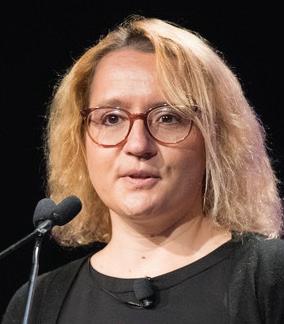
LYNN MINNAERT , Ph.D., was named dean of MSU Denver’s School of Hospitality in January. She emerged as the top candidate after impressing campus stakeholders with her expertise in delivering industry-driven curriculum innovations and improving the student experience. Most recently, Minnaert was a professor and head of subject for Tourism and Languages at Edinburgh Napier University Business School in Scotland, where she oversaw a team of 35 faculty members serving more than 1,000 students.
NEW BOARD MEMBERS
MSU Denver’s Board of Trustees welcomed three new members in early 2024: Ryan Frazier, Rachel Kaygi and Laura Pinnie. They were appointed by Gov. Jared Polis in January.

FRAZIER has been managing partner and CEO of Frazier Global, an international management-consulting and sustainable-finance firm, for more than a decade. He brings over 25 years of experience in the private sector and has served as an Aurora city councilman. He is also the business expert on 9News, where he hosts the weekly Business Brief. Frazier was appointed to complete the term of Michael Kopp, which ends Dec. 31.

KAYGI is the managing director of a network of political consulting firms, specializing in research and donor advisement. She previously served on the executive committee of Polis’ inaugural and was appointed to the governor’s task force for developing guidelines for reentry to K-12 schools during the pandemic. Kaygi is passionate about the importance of connecting K-12 to higher education and workforce development.
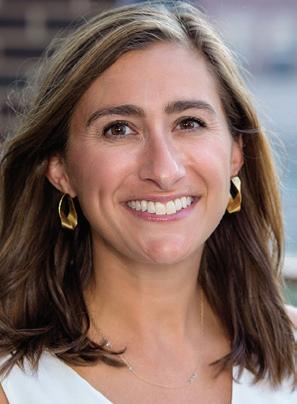
PINNIE has spent her career at the intersection of finance and social impact, investing in companies and initiatives that aim to improve our educational, health care and financial systems. She is a director of investment at ZOMA Capital, where she leads workforce-related efforts focused on strengthening the partnership between education and employers. She also serves as a court appointed special advocate.
Kaygi and Pinnie were appointed to vacant board seats, with terms expiring at the end of 2027.
SPRING 2024 | RED MAGAZINE 35
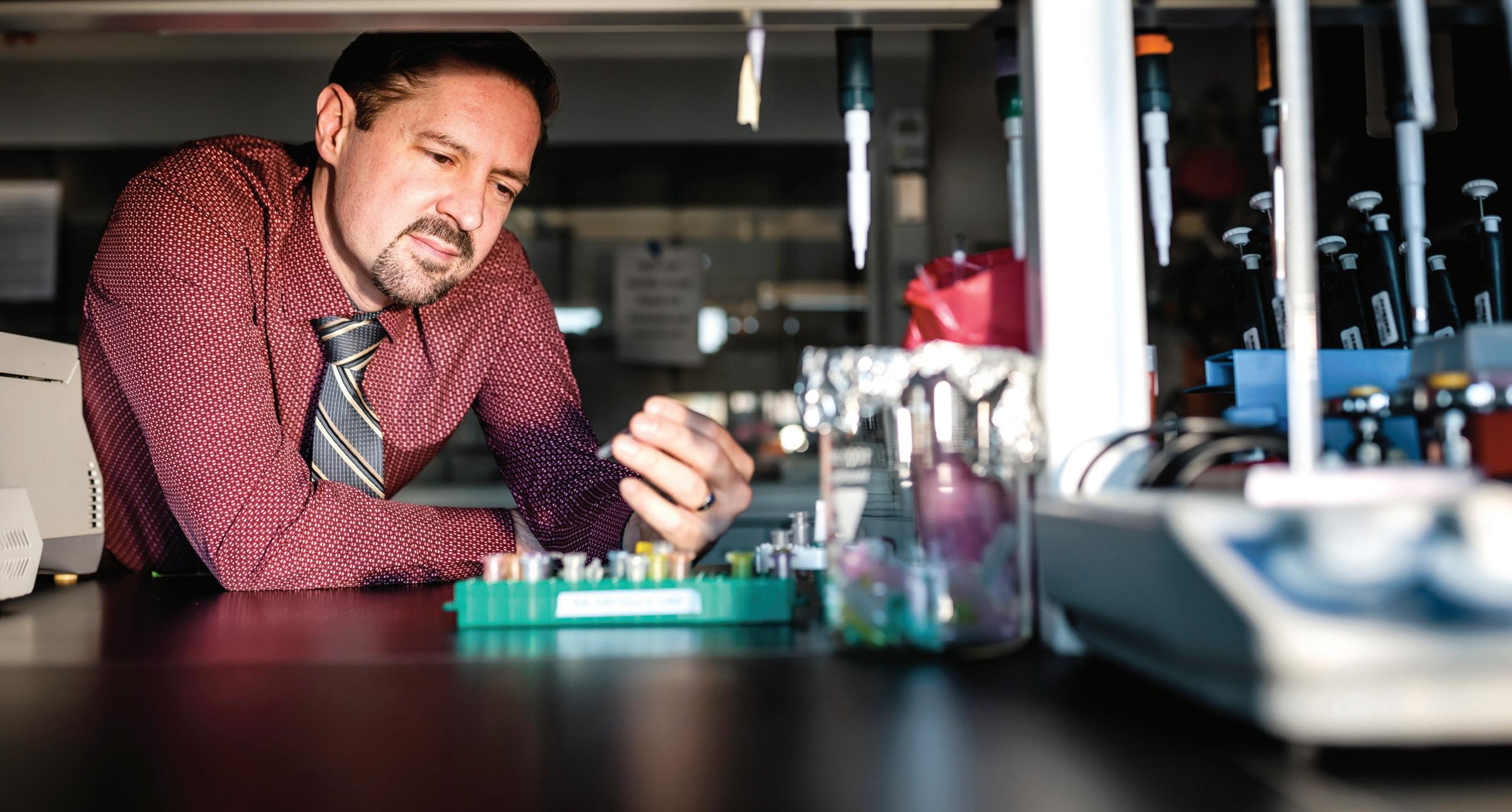
Chemistry professor gets right reaction
Andrew Bonham, Ph.D., is a catalyst for the careers of future scientists. The chair of the Department of Chemistry and Biochemistry at Metropolitan State University of Denver is beloved by students for his compassionate mentorship and commitment to undergraduate research. In his time at the University, 20 of his undergraduate students have been published in respected scientific journals, with a recent team authoring research on developing a rapid test to detect lung cancer. RED Magazine interviewed Bonham to discuss his start in science, how he inspires students to succeed and recent undergraduate research projects.
How does your own science story inspire your work with students? I had zero formal scientific education growing up. Like many of my students, I associated the subject with intellectual giants such as Einstein. I just thought, “That’s not me.” But now, I appreciate that real scientific progress happens when numerous people each add their own little nuggets of knowledge to help shape the bigger picture. These days, I get up every morning determined to teach my students that they are exactly what a scientist looks like. Anyone with critical-thinking skills and a positive attitude can make a distinct contribution and help push progress in the right direction.
Why have you put such a strong emphasis on undergraduate research? I simply don’t believe that you need to be a postgraduate before you can achieve real, publishable science. For example, a team of my undergraduates recently published research about developing a rapid test for the detection of some forms of lung cancer. The project started when one of my students came to me and suggested the idea. And that’s how it works: If you give them the chance, they will produce incredible results.
How hopeful are you that your undergraduate team’s research might prove fruitful? I feel pretty positive. Lung cancer is currently the country’s primary cancer killer, largely because half of all cases only get diagnosed at an advanced stage, when treatment options are limited. But my students’ early detection test focuses on identifying key danger signs in the blood before any clinical cancer symptoms even become apparent. Their work is at a very early stage, but if successful, it would ultimately mean catching cancer symptoms at an earlier stage and greatly improving survival rates.
This Q&A has been edited for brevity and clarity.
36 RED MAGAZINE | SPRING 2024
Q&A ANDREW BONHAM HELPS STUDENTS ACHIEVE THE BEST POSSIBLE START TO THEIR CAREERS IN SCIENCE. // BY MARK COX
ALYSON M c CLARAN

Top bird
Metropolitan State University of Denver’s campus got even rowdier in January with the installation of a new statue celebrating the University’s beloved mascot. Funded by gifts from supporters, the Rowdy the Roadrunner Mascot Statue perches in front of the Jordan Student Success Building. At the unveiling event, hosted by the Alumni Association Board of Directors, University leaders feted the new addition to the JSSB lawn. But no one was as excited as real-life Rowdy, also in attendance, whose likeness is now preserved for future generations of Roadrunners.
JOSH GEURINK

Non-Profit Org. U.S. Postage PAID Permit 2965 Denver, CO Campus Box 86 P.O. Box 173362 Denver, CO 80217 Learn More msudenver.edu/changemakers




 JANINE DAVIDSON , Ph.D. President, Metropolitan State University of Denver
JANINE DAVIDSON , Ph.D. President, Metropolitan State University of Denver



























 MSU Denver alumna Keisha Mathes is the owner of Herbal Honey, a business focused on wellness through medicinal herbs.
Lavender Cream is one of Herbal Honey’s seasonal tea blends.
KEISHA MATHES, MSU DENVER ALUMNA
MSU Denver alumna Keisha Mathes is the owner of Herbal Honey, a business focused on wellness through medicinal herbs.
Lavender Cream is one of Herbal Honey’s seasonal tea blends.
KEISHA MATHES, MSU DENVER ALUMNA




 Nicole Predki, left, and Leslie Merrill Schmidt, right, co-coordinators of the MSU Denver Dance program, lead Ronnie Sherman through her steps at Balfour Senior Living.
Nicole Predki, left, and Leslie Merrill Schmidt, right, co-coordinators of the MSU Denver Dance program, lead Ronnie Sherman through her steps at Balfour Senior Living.






















